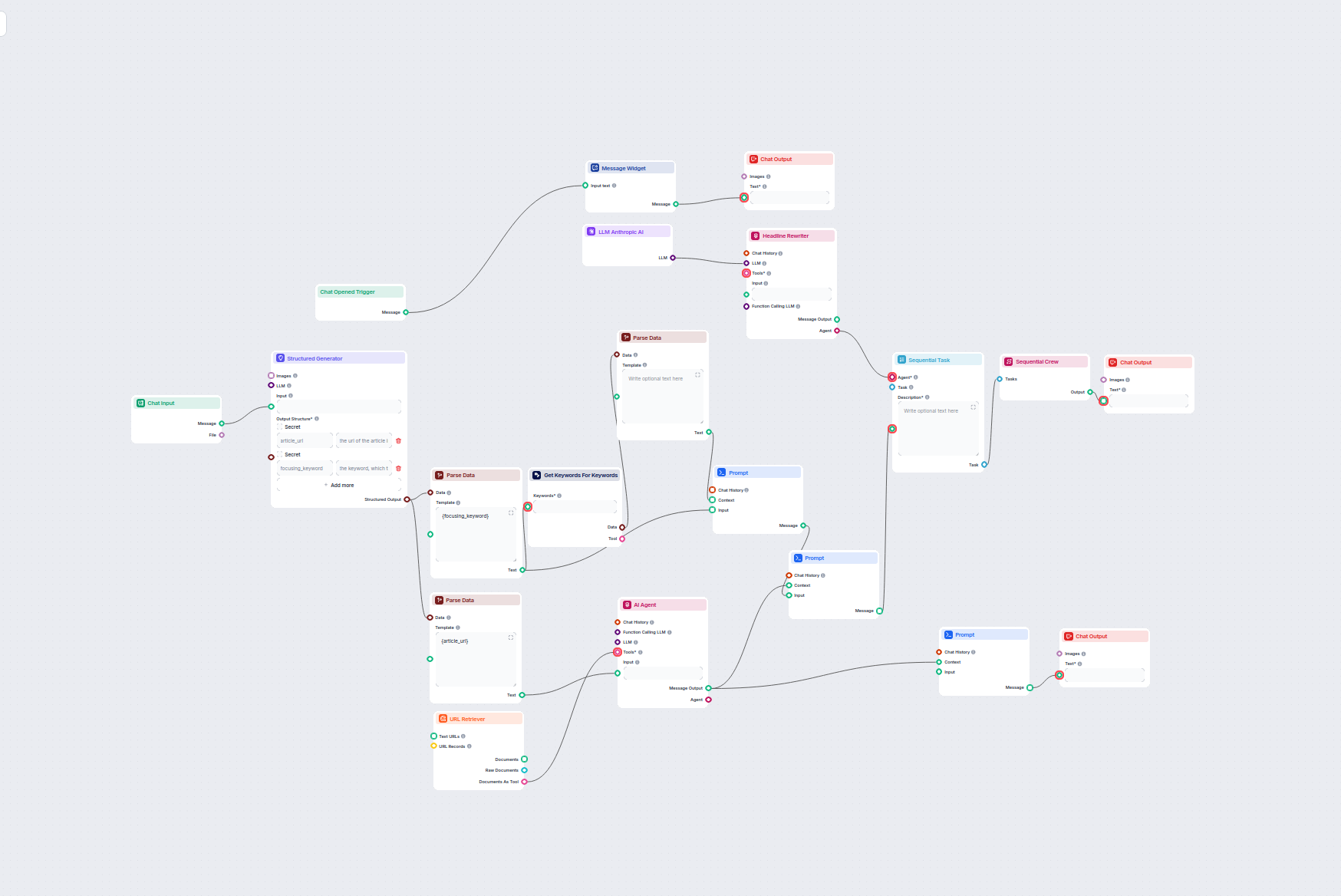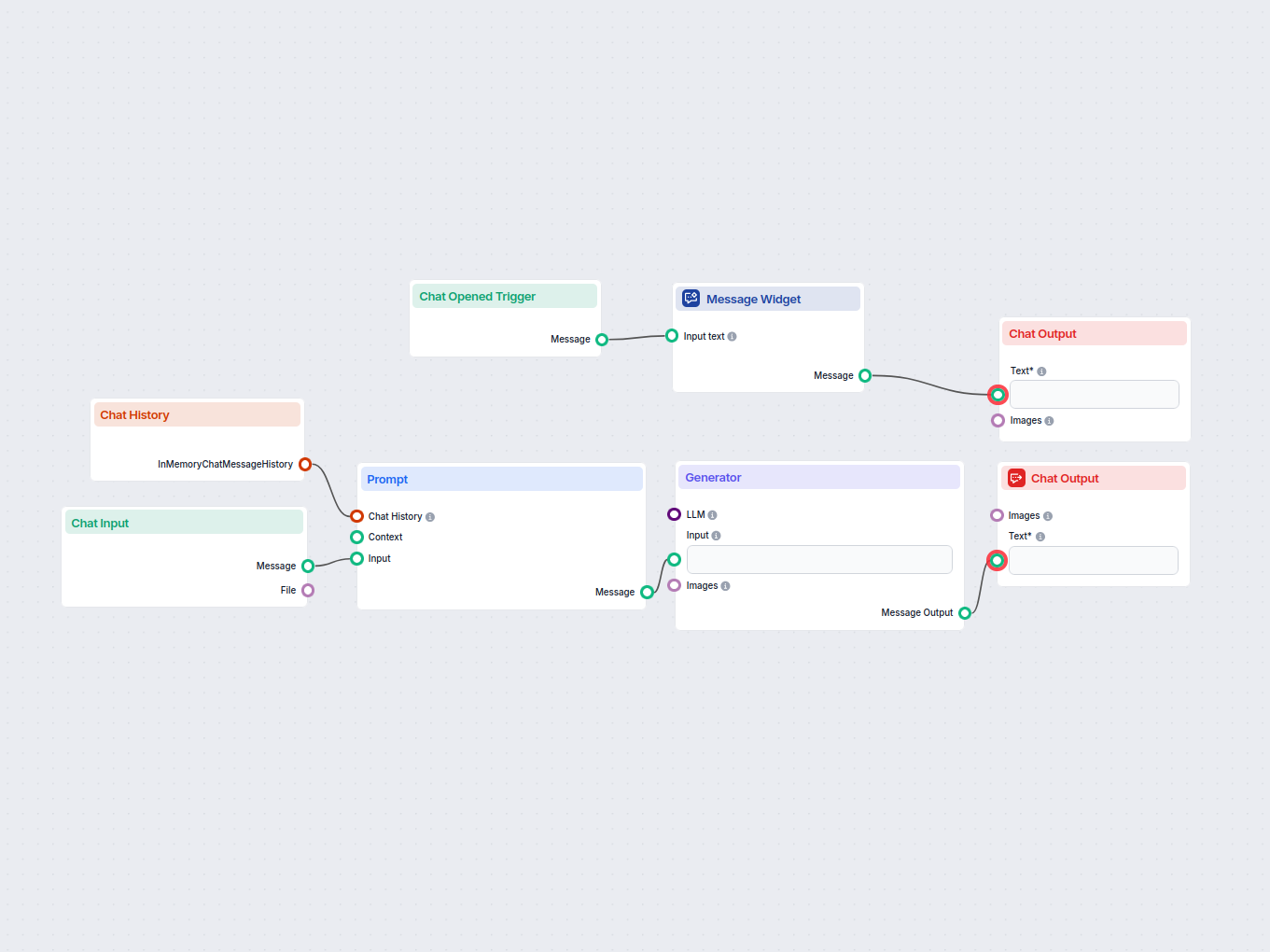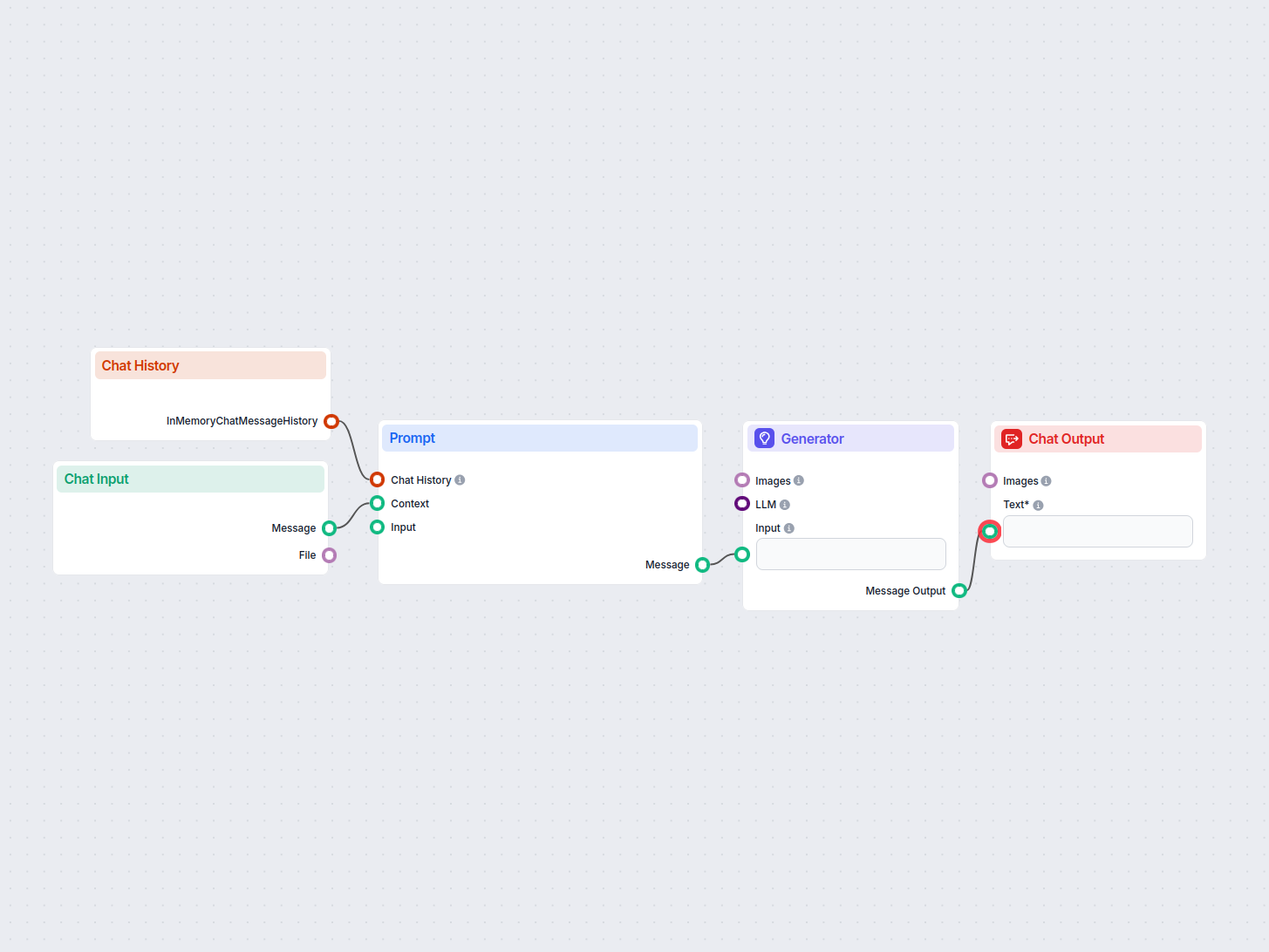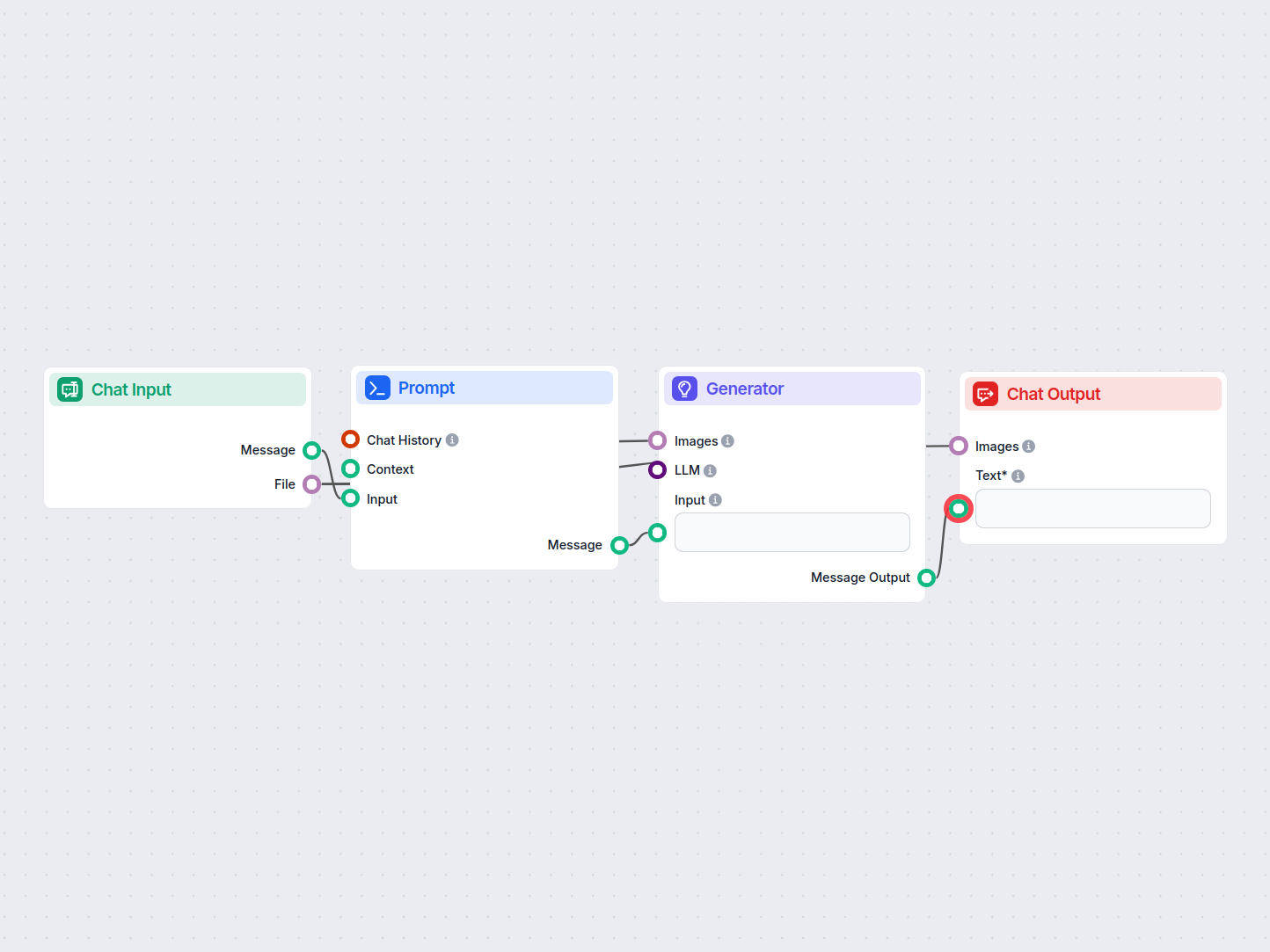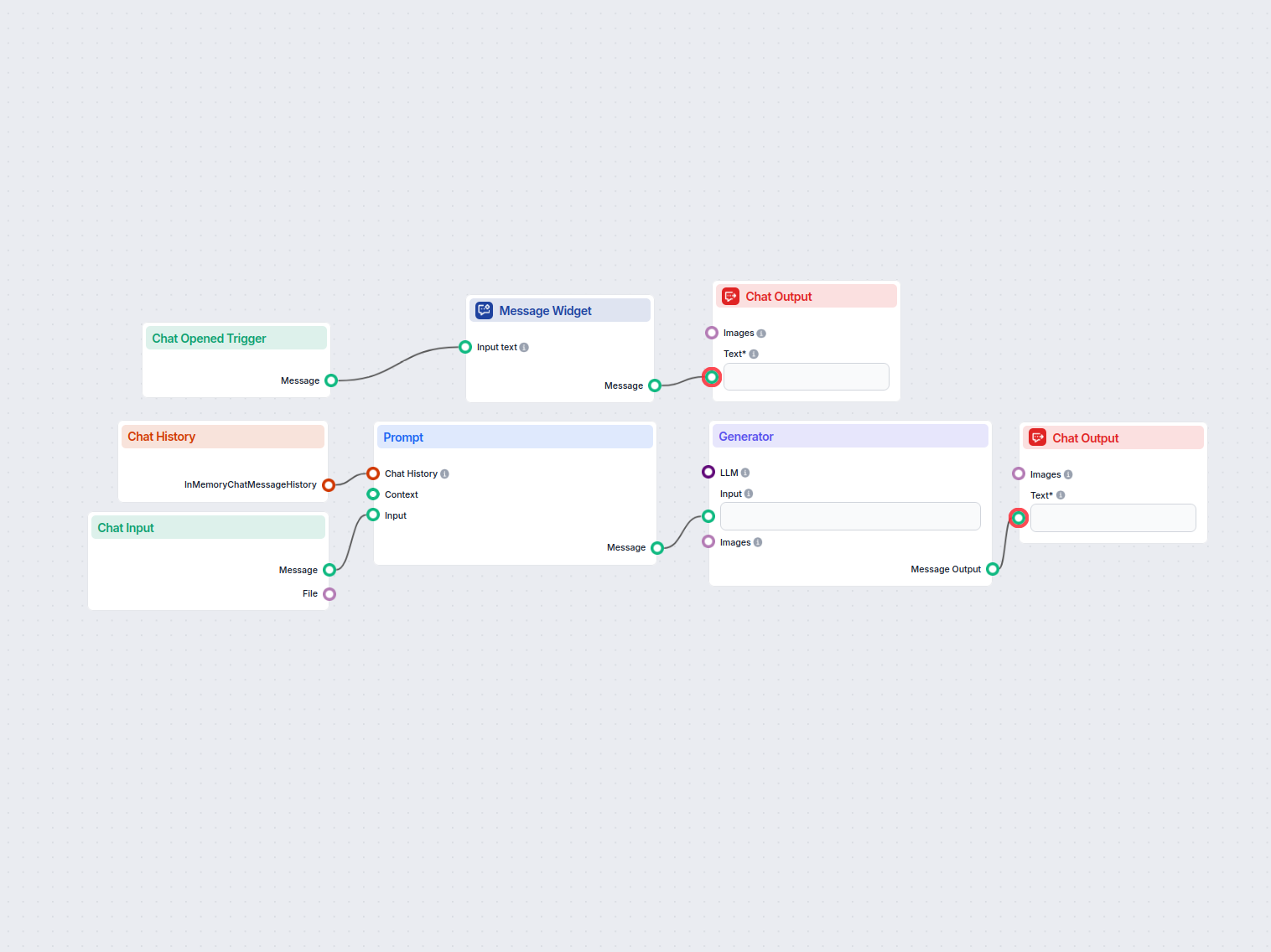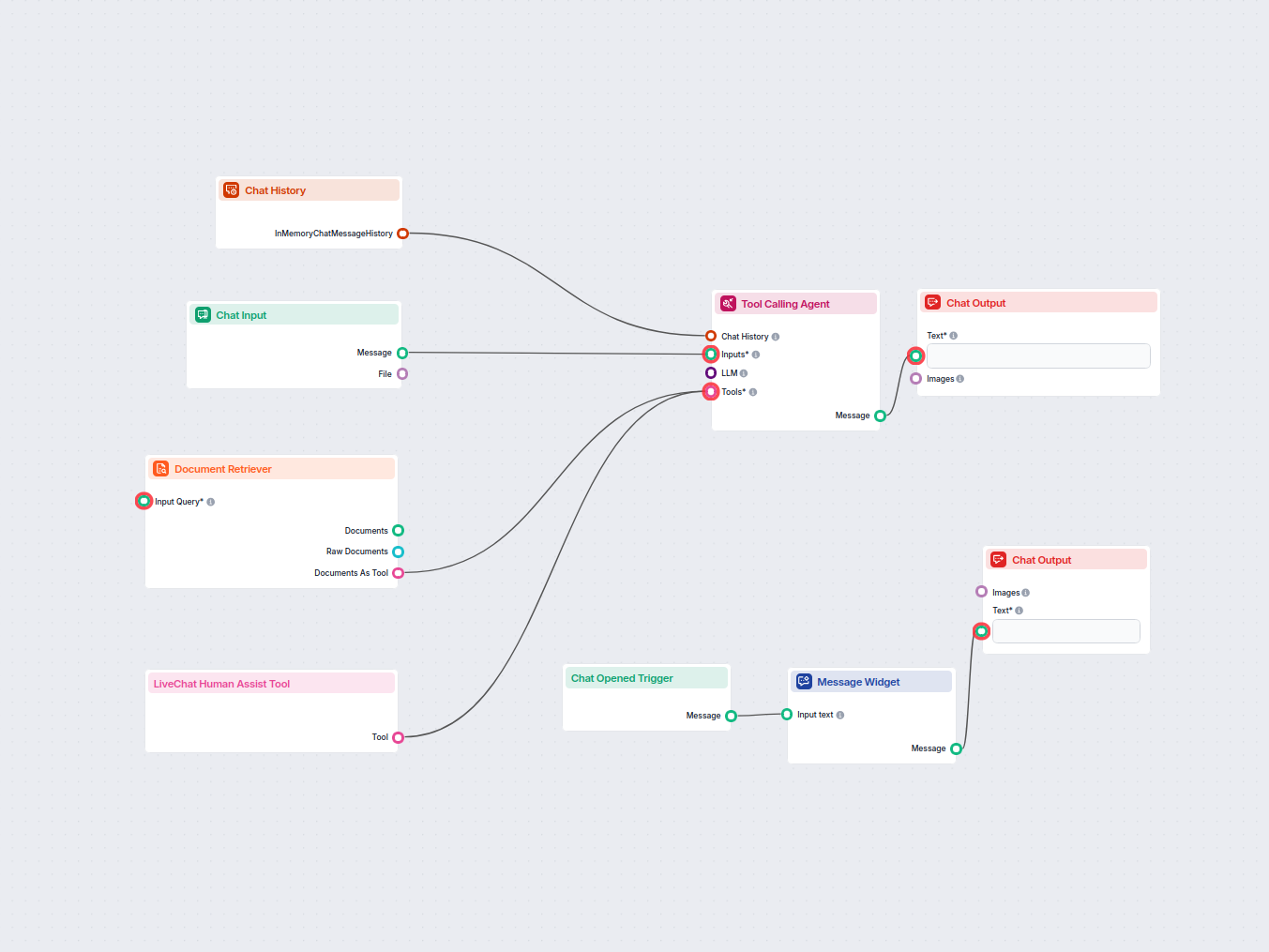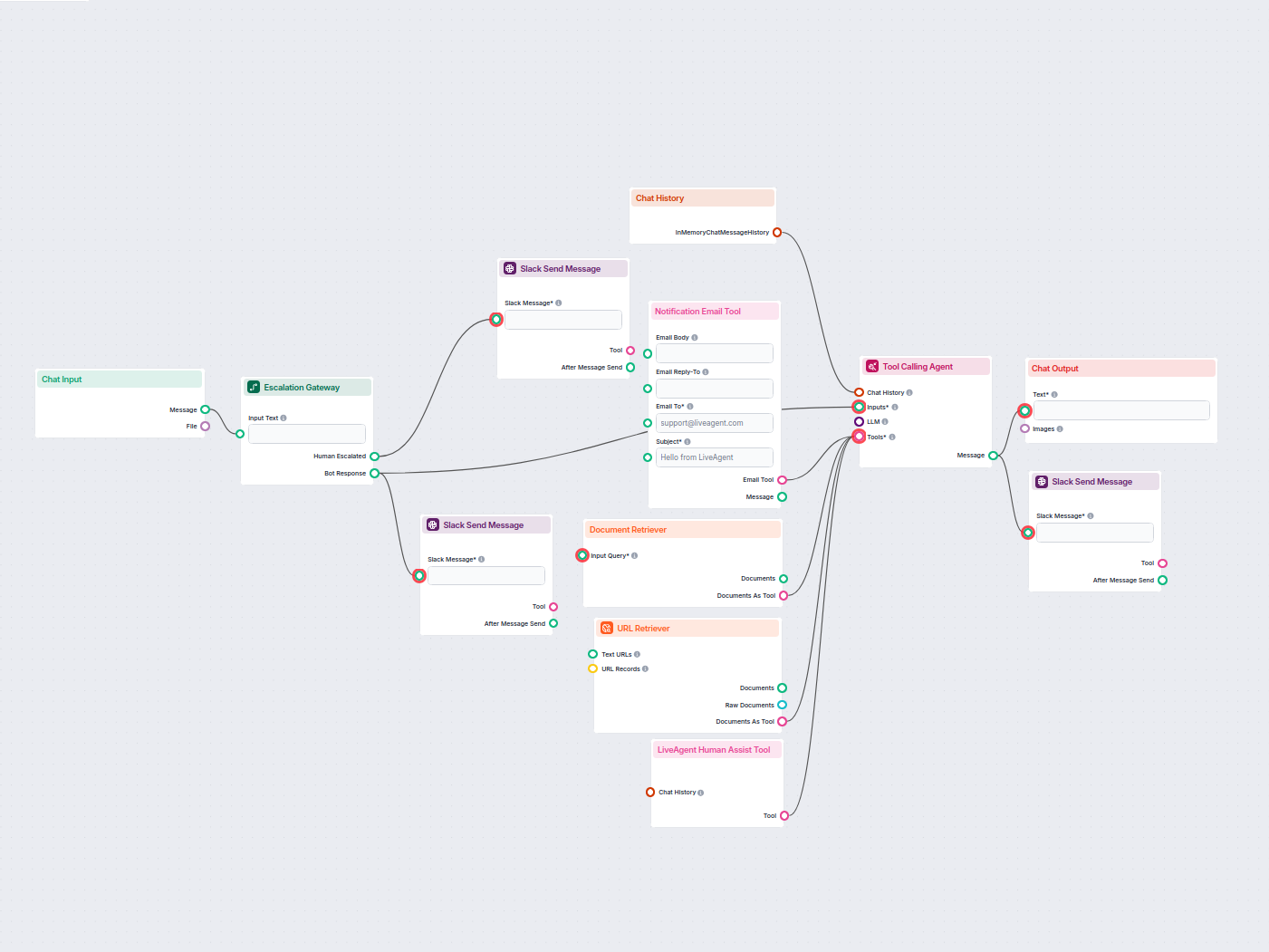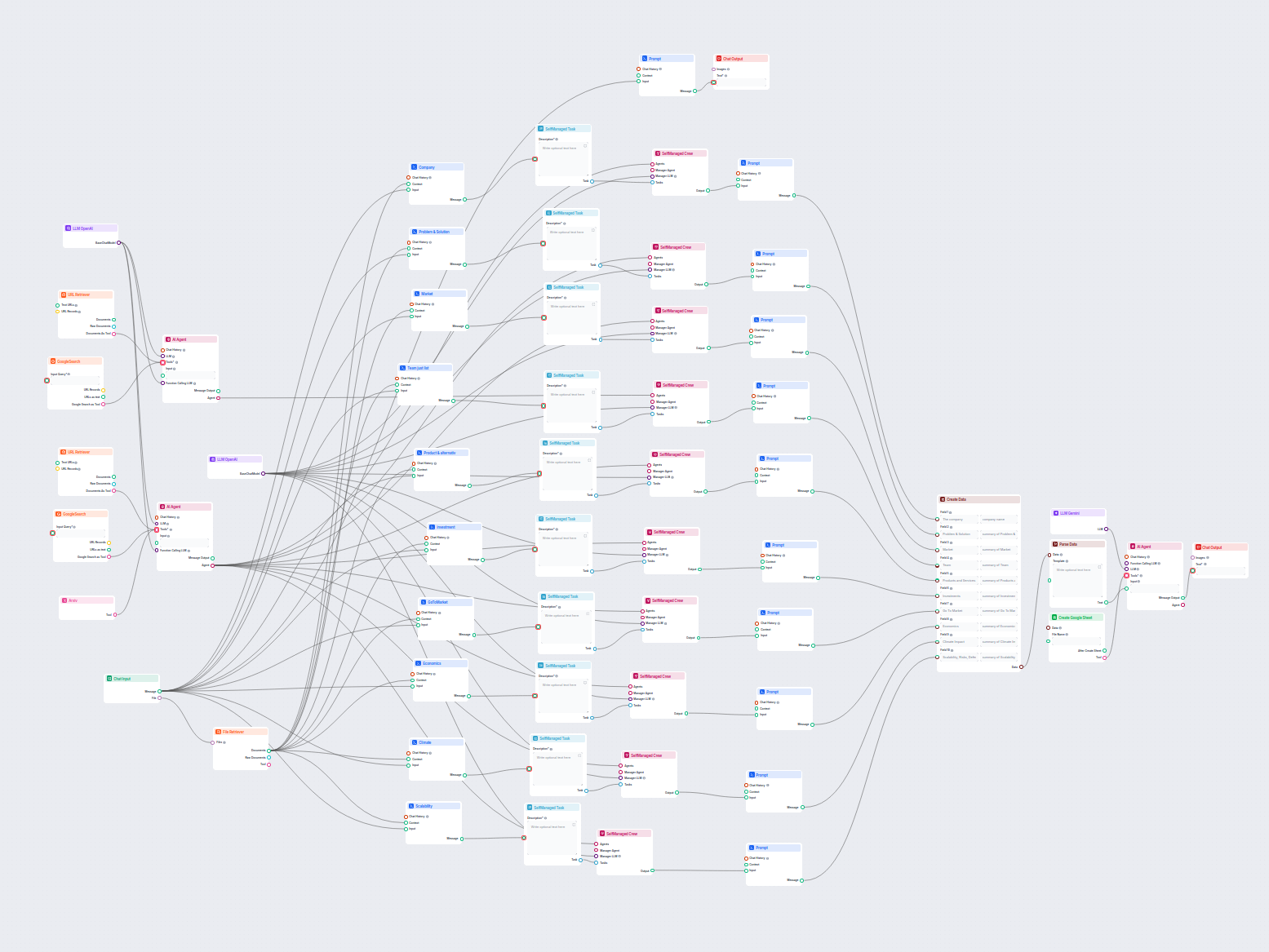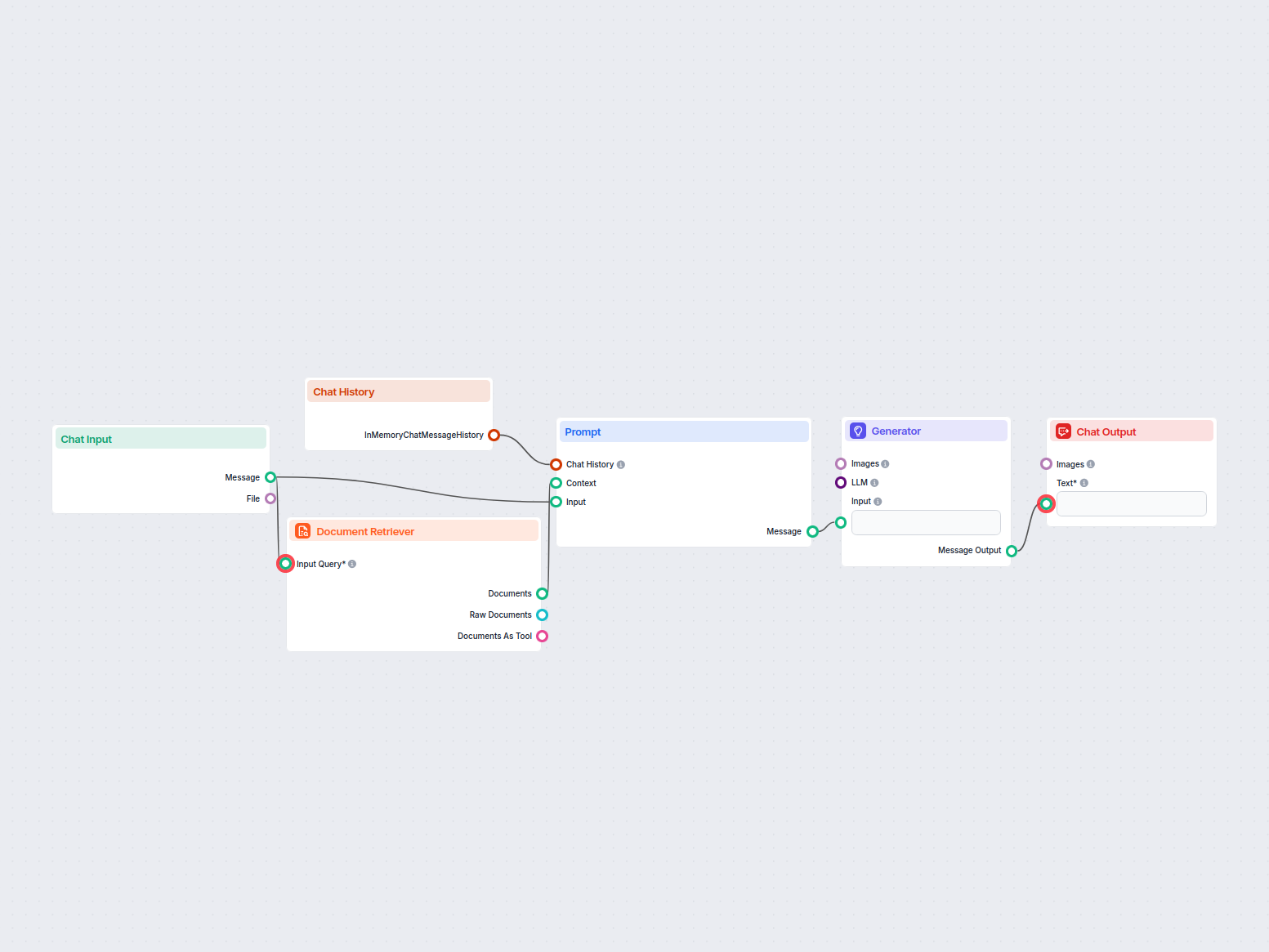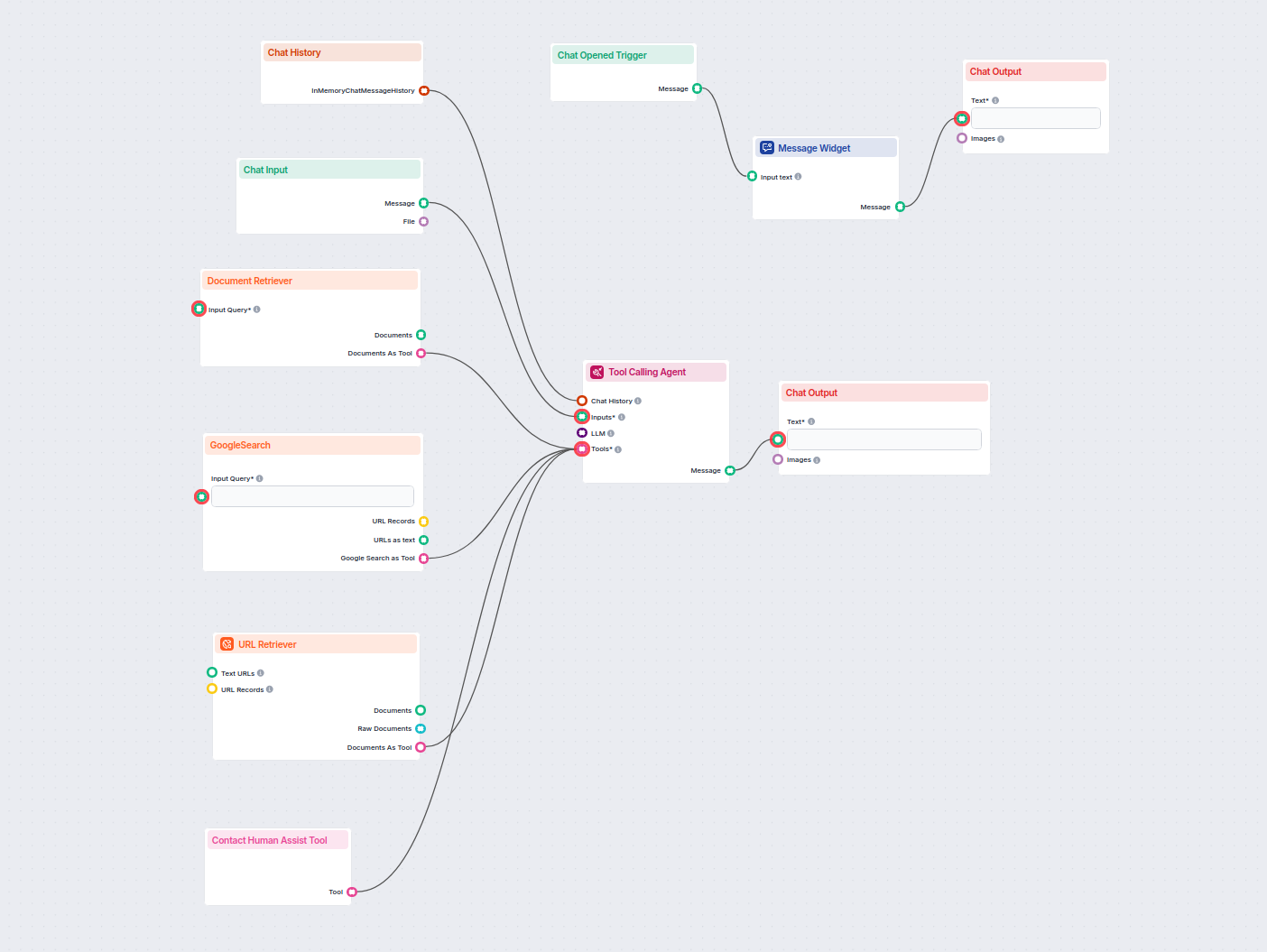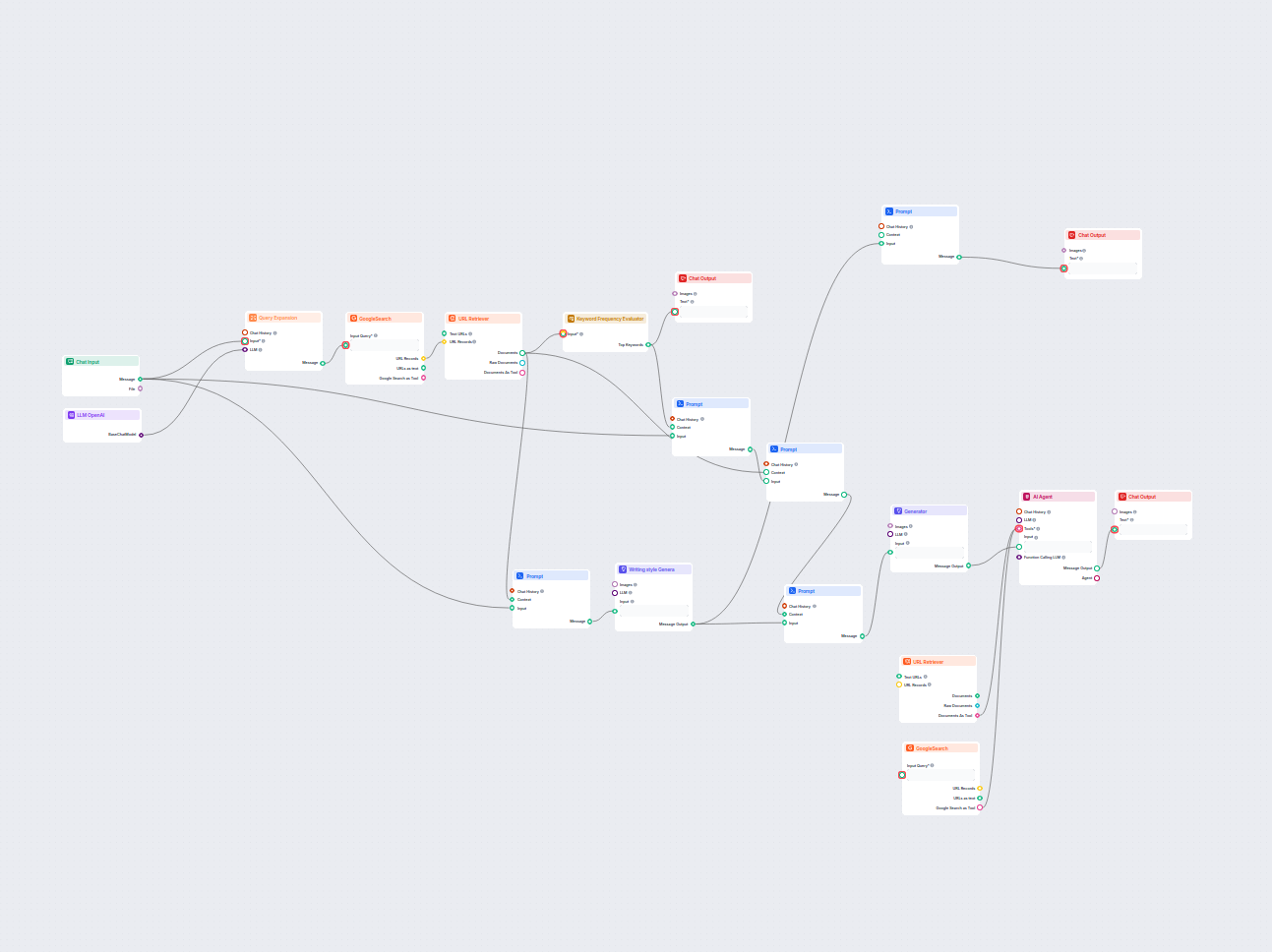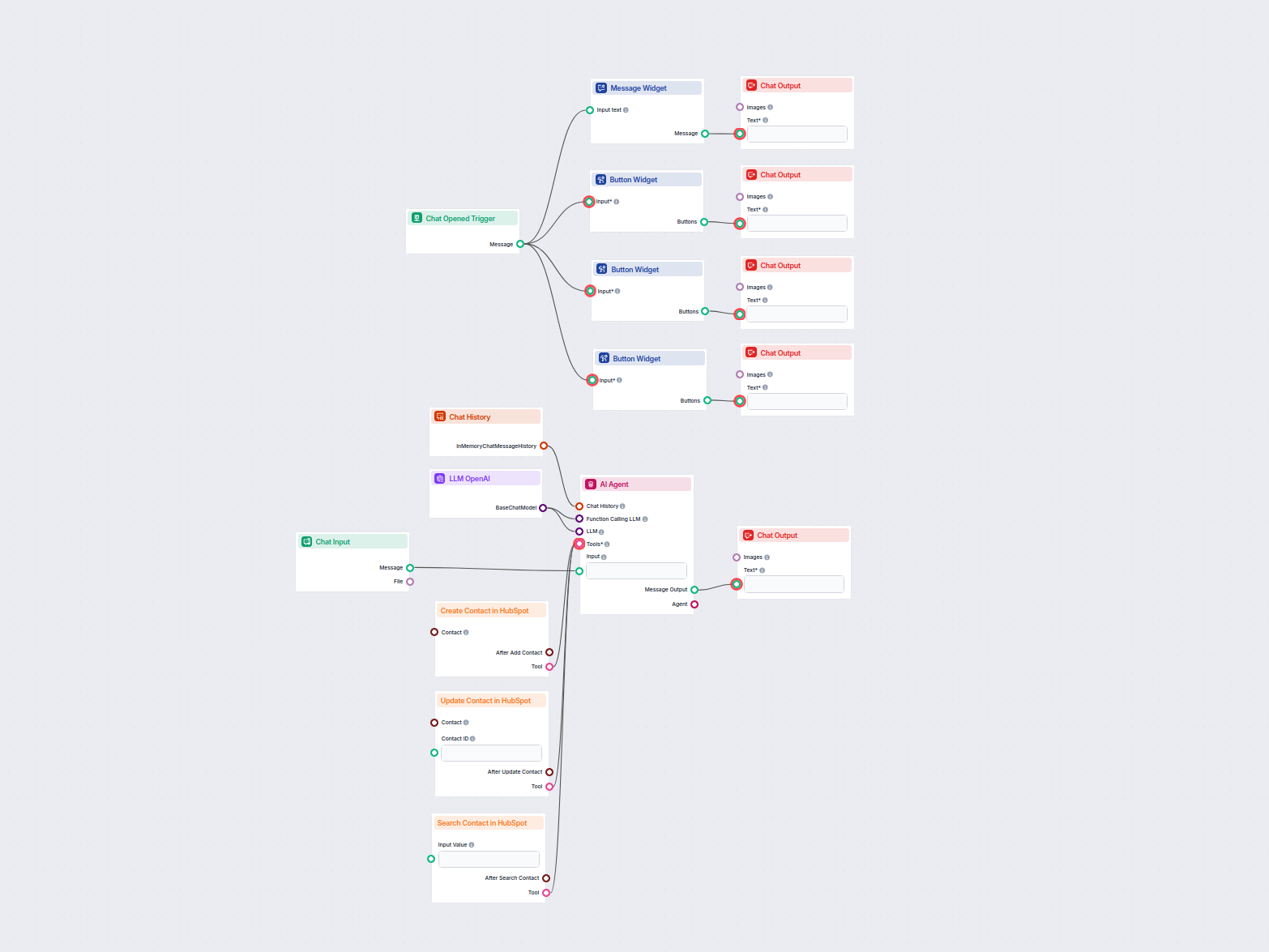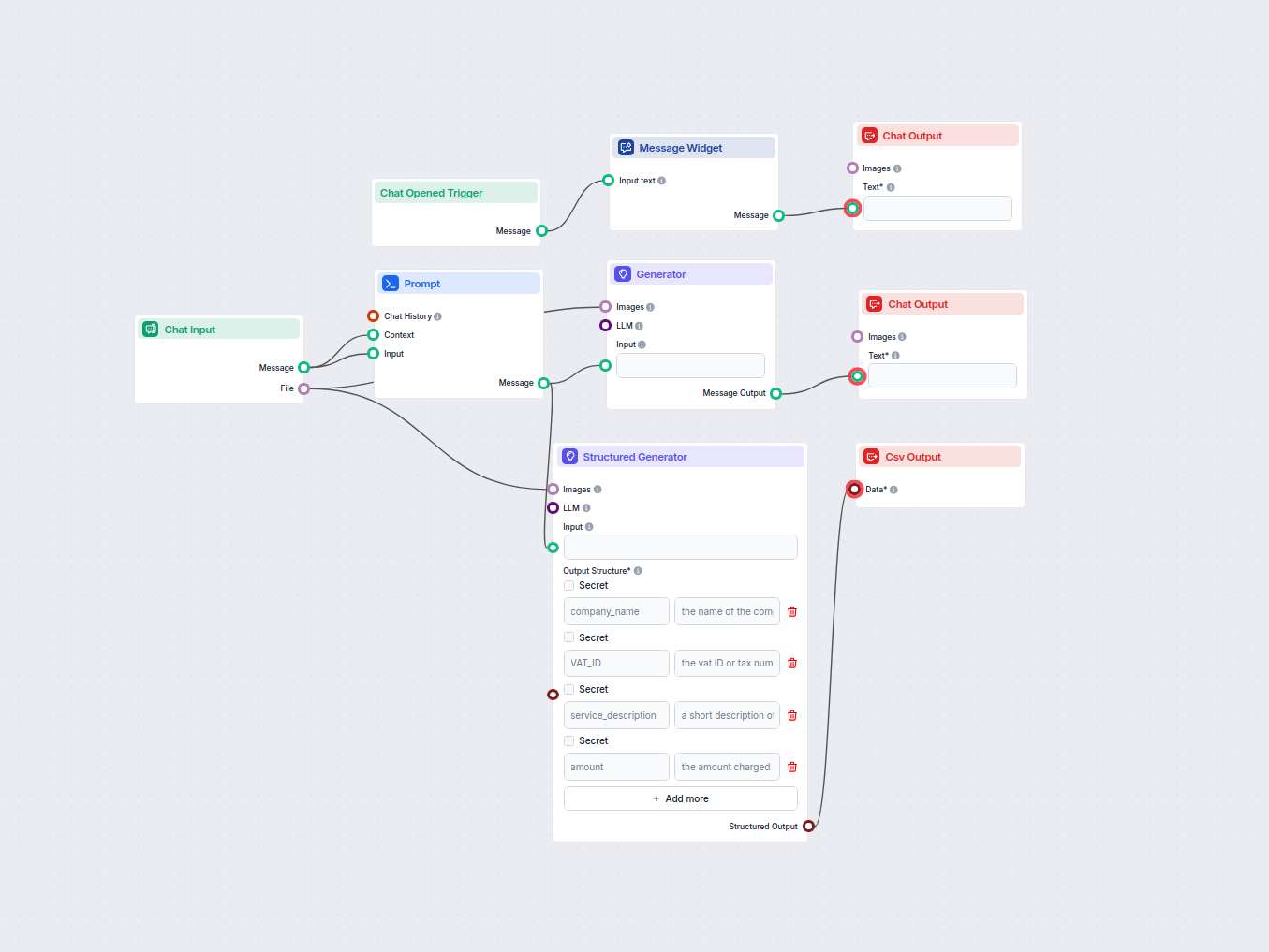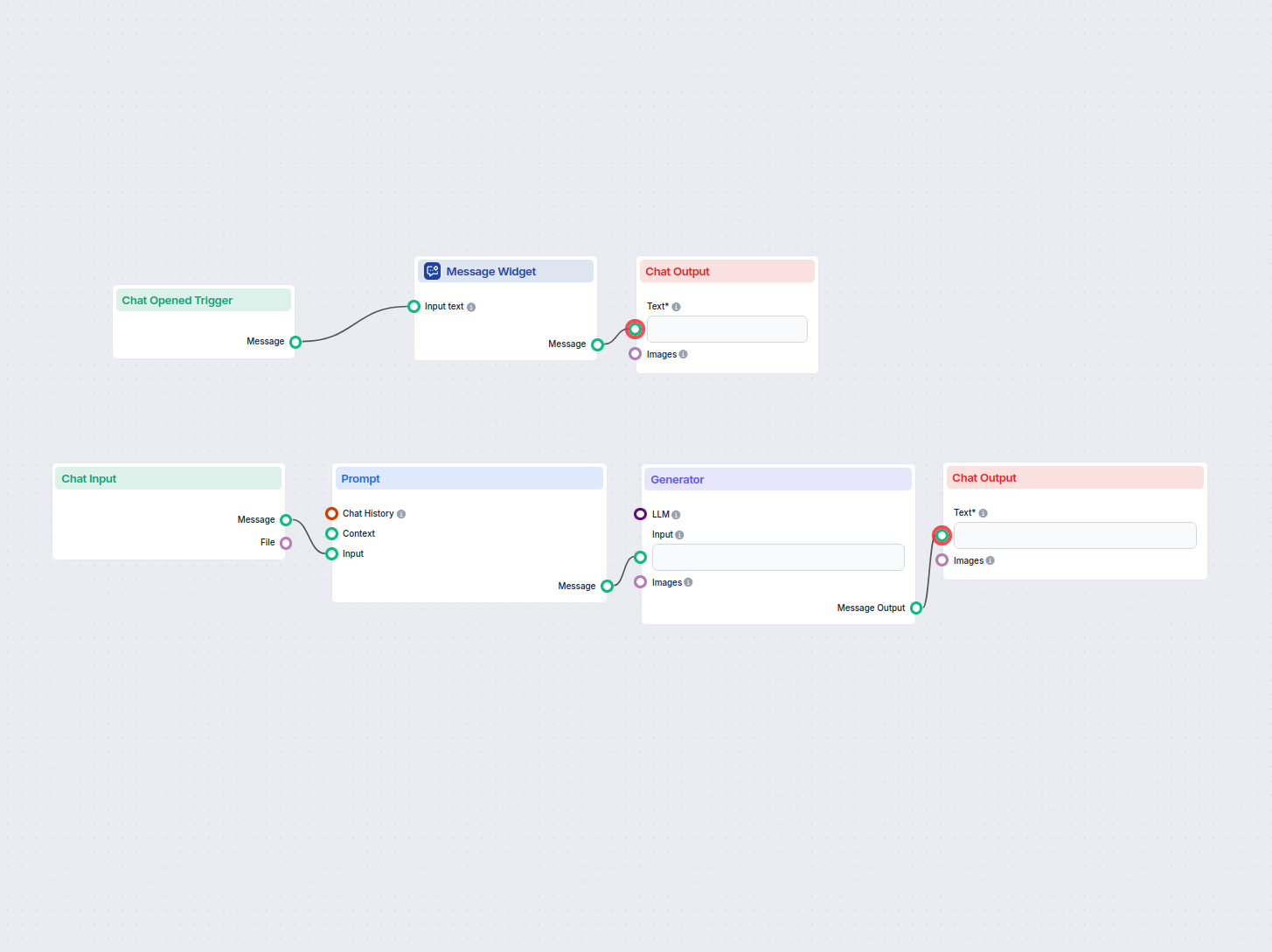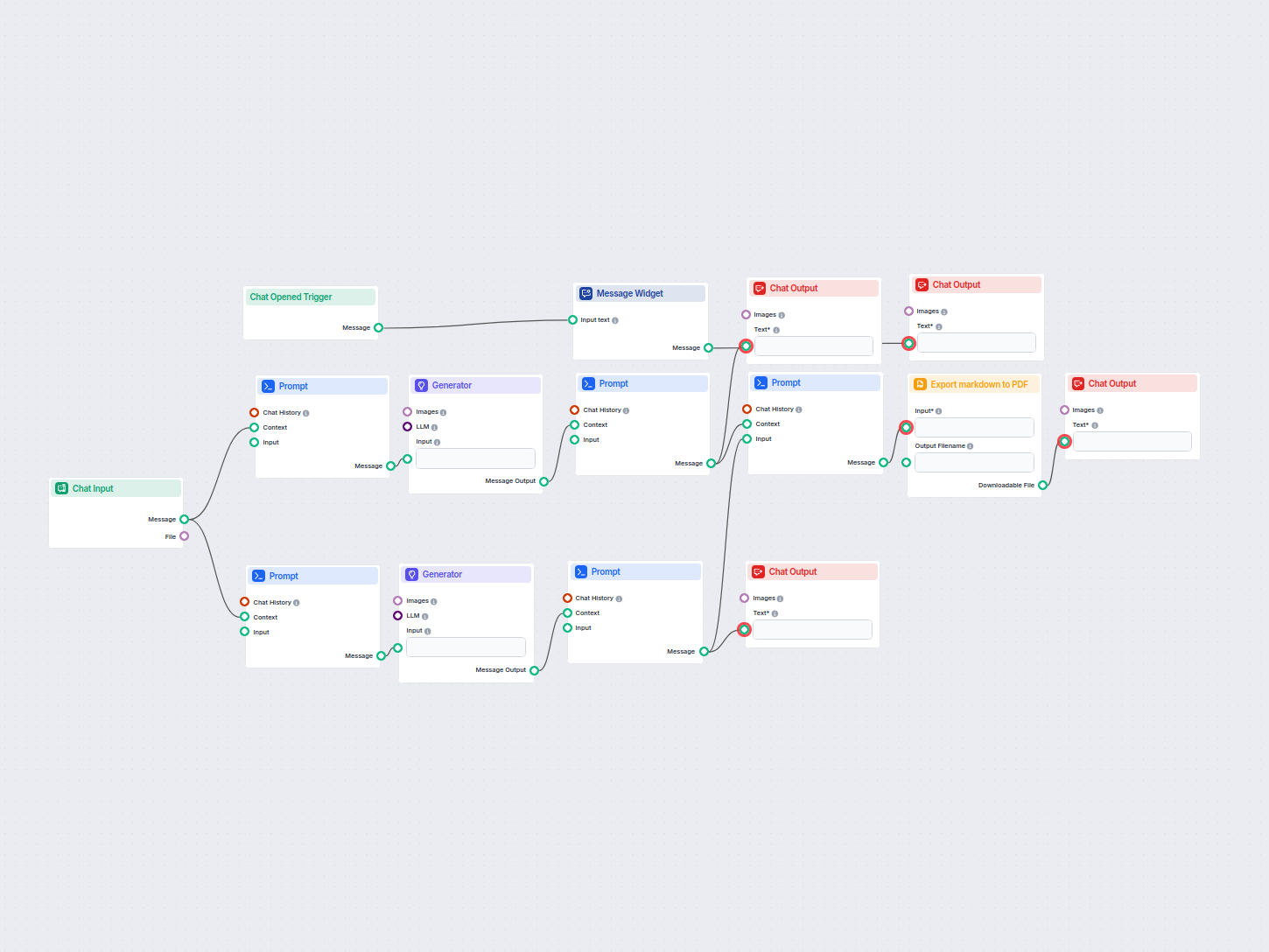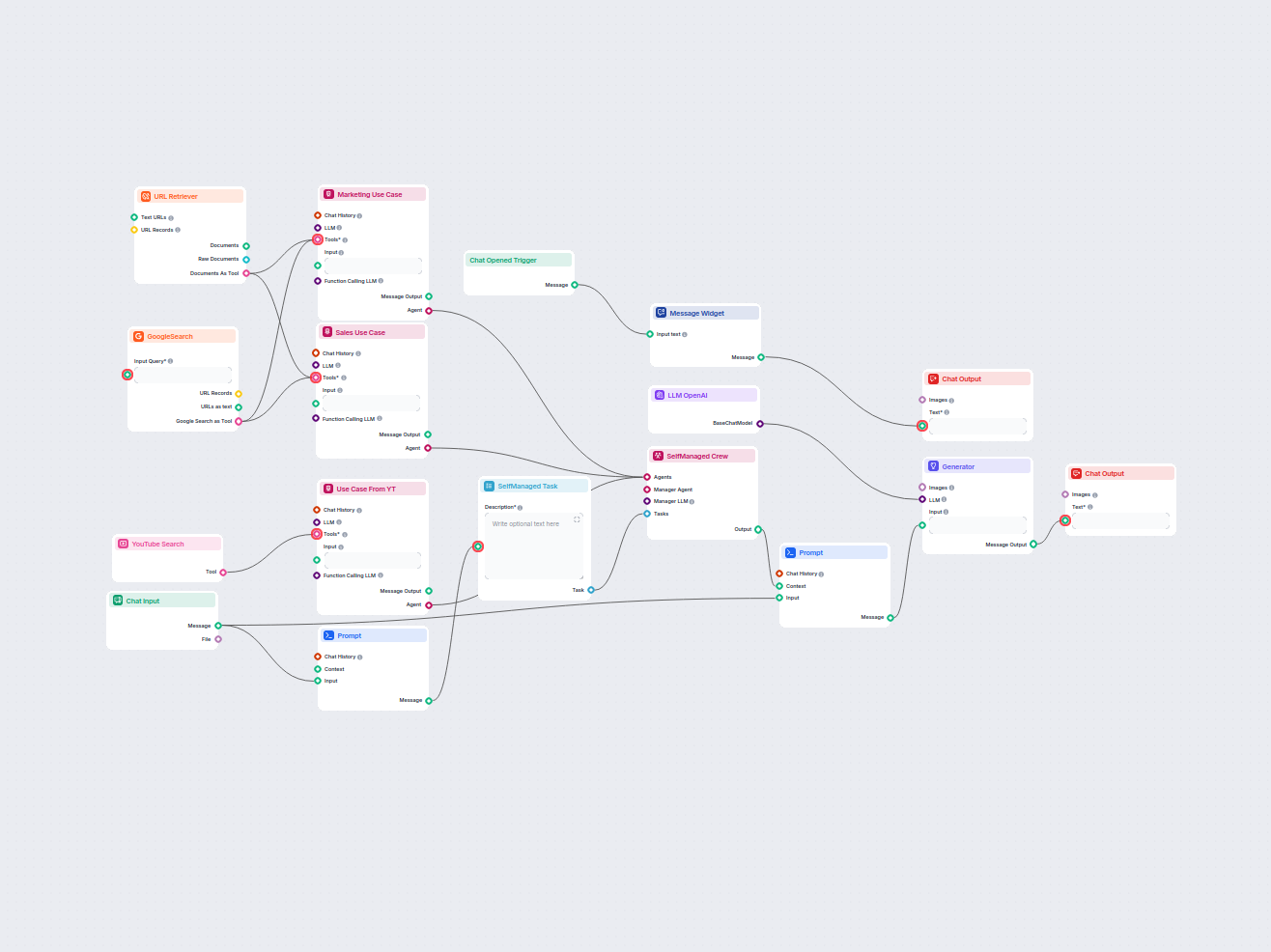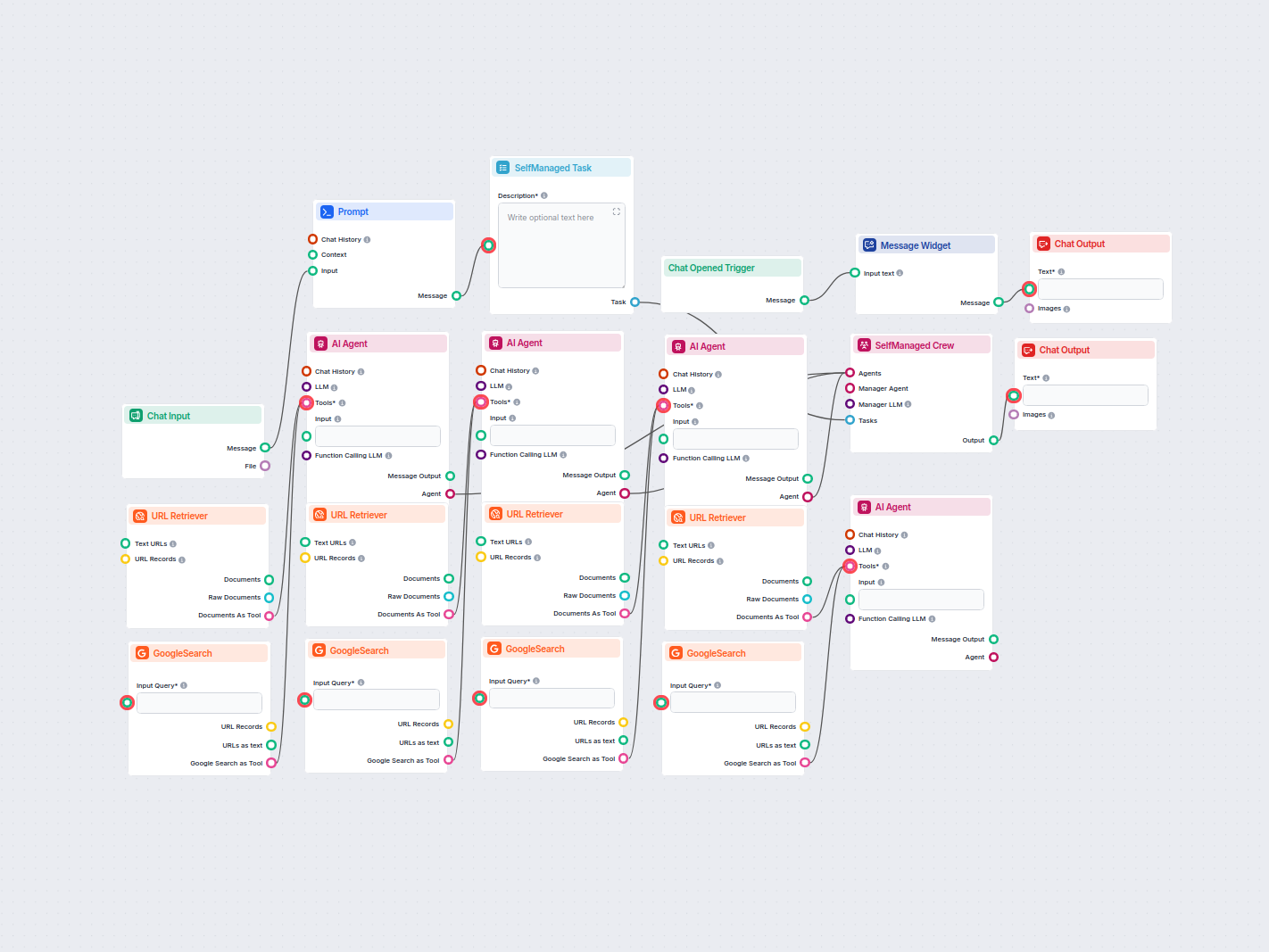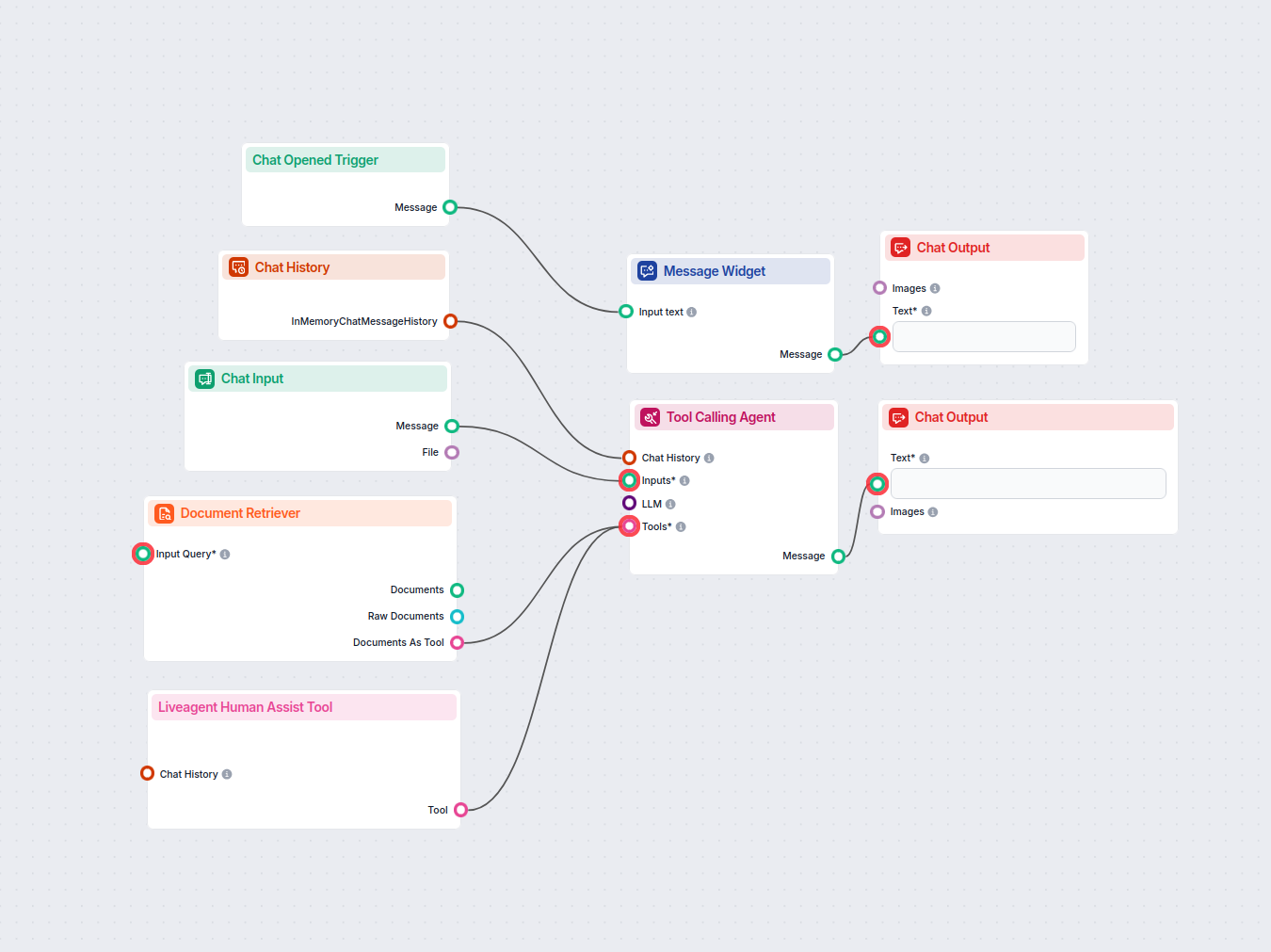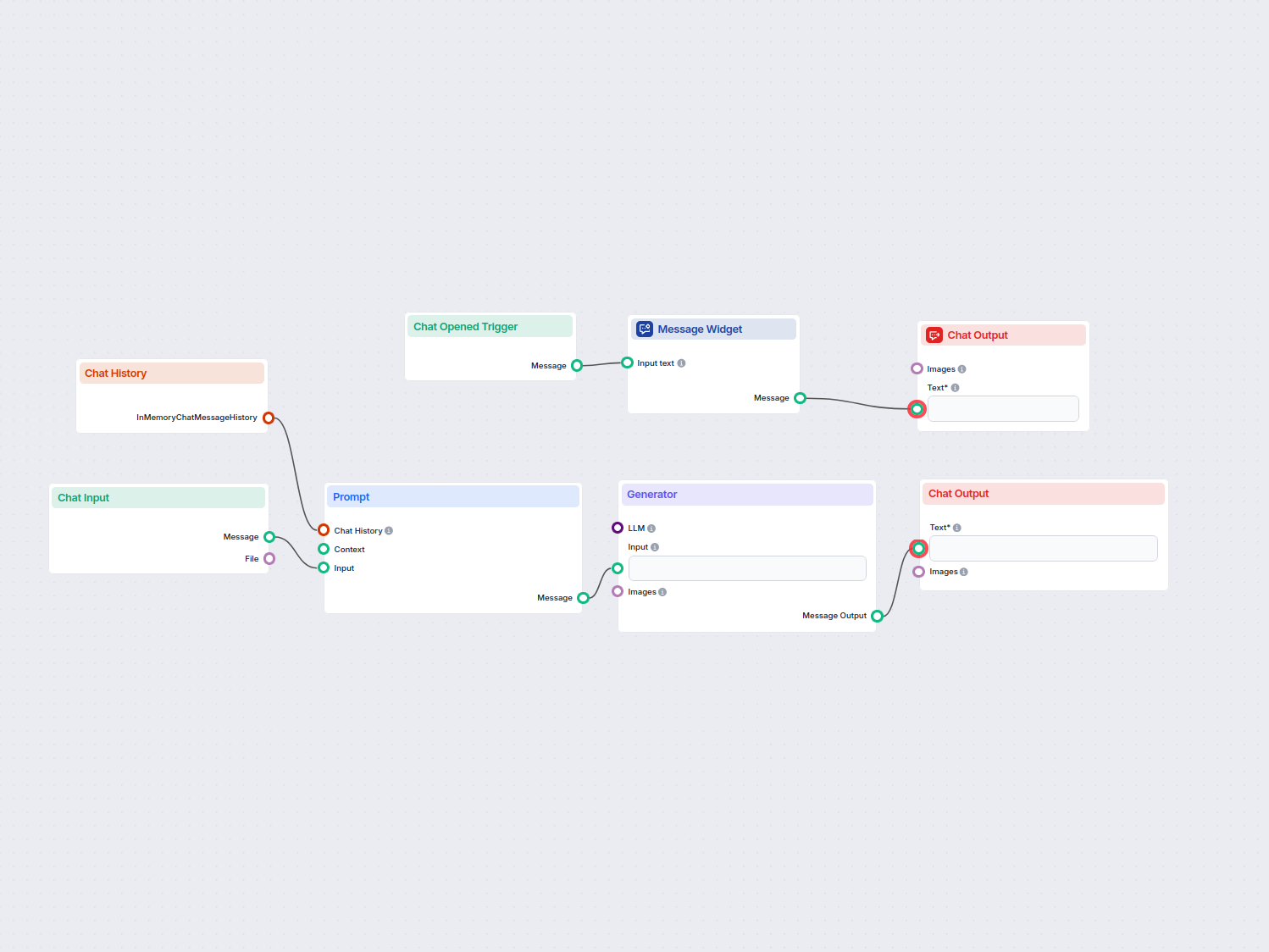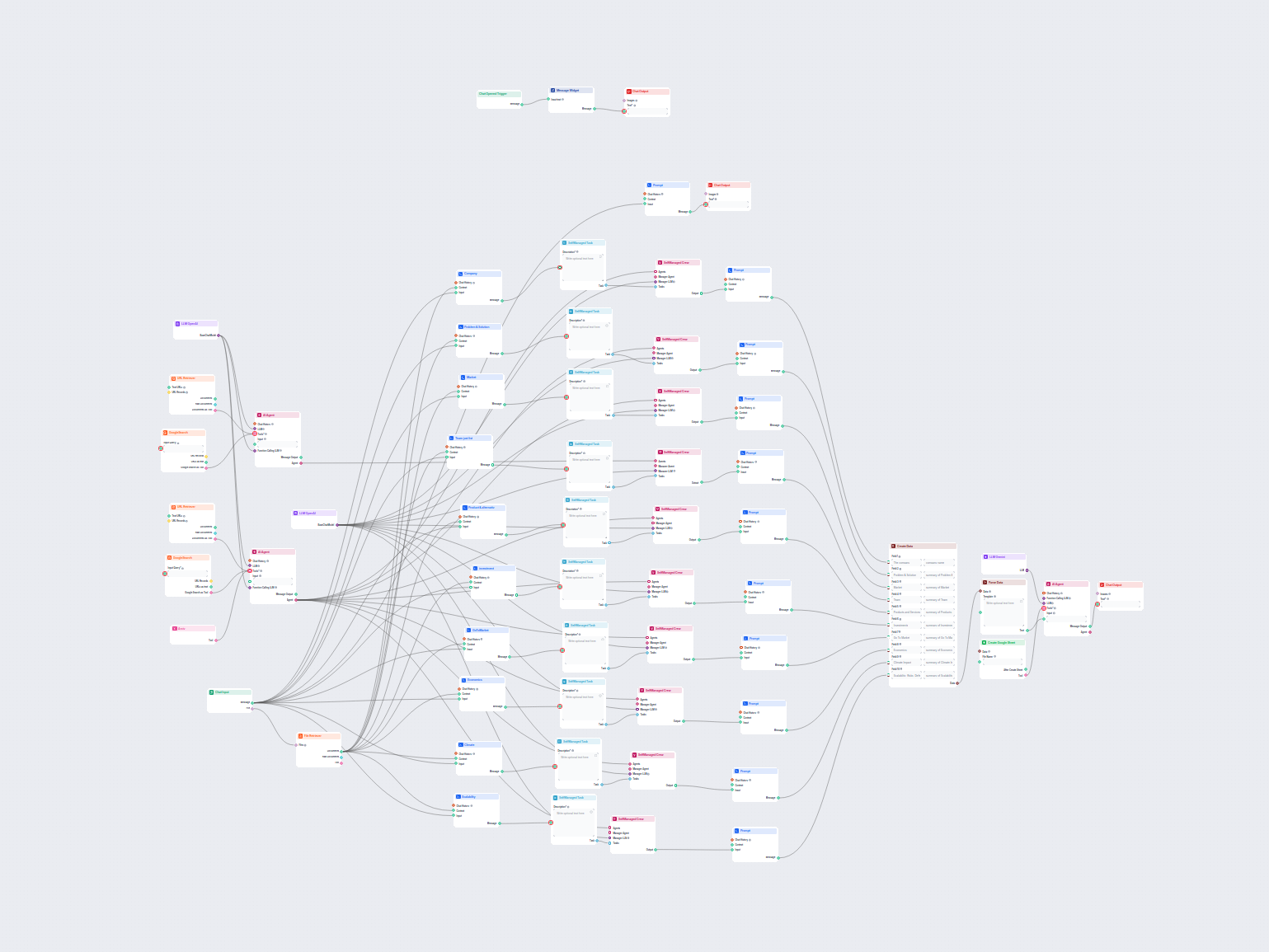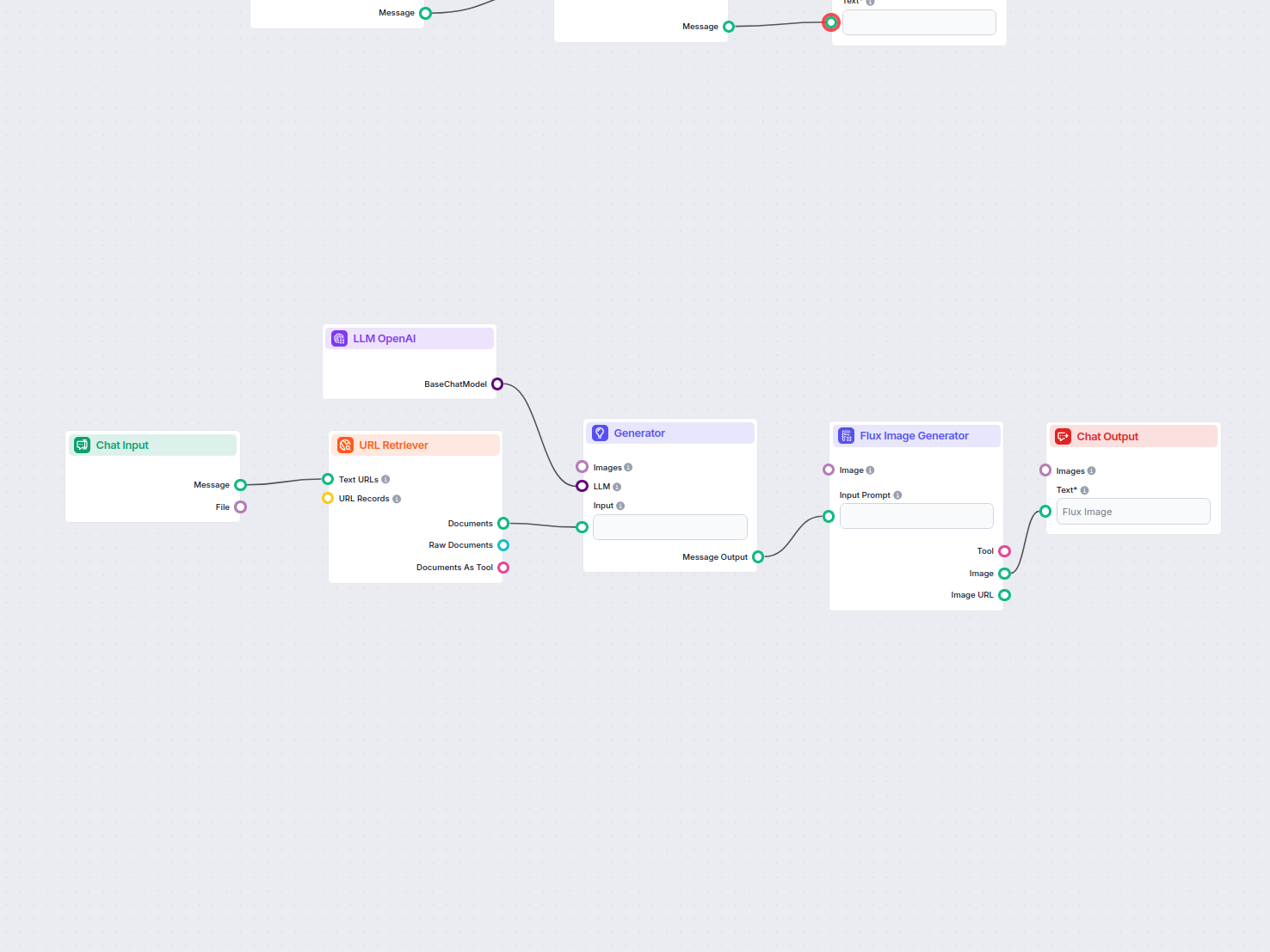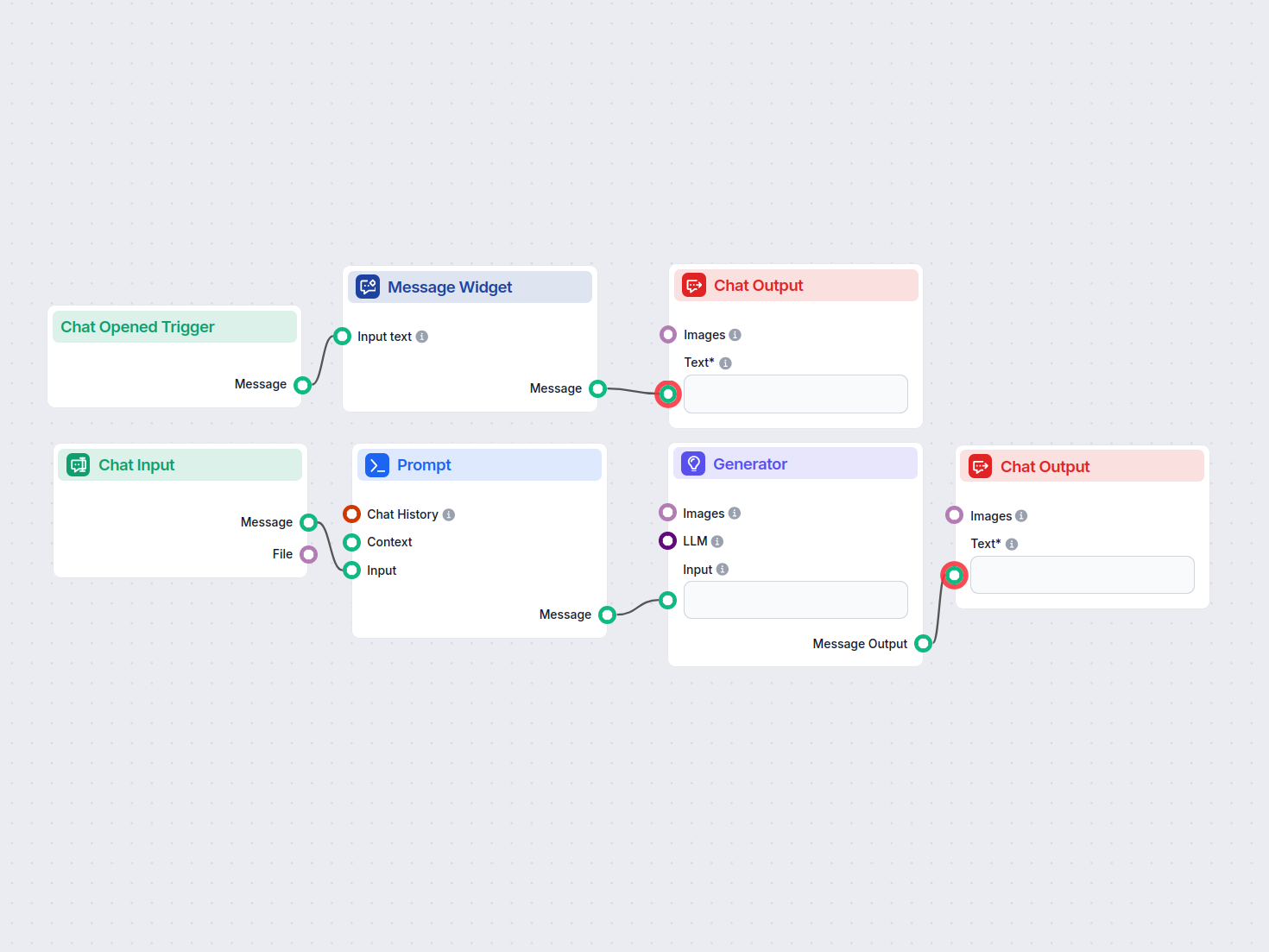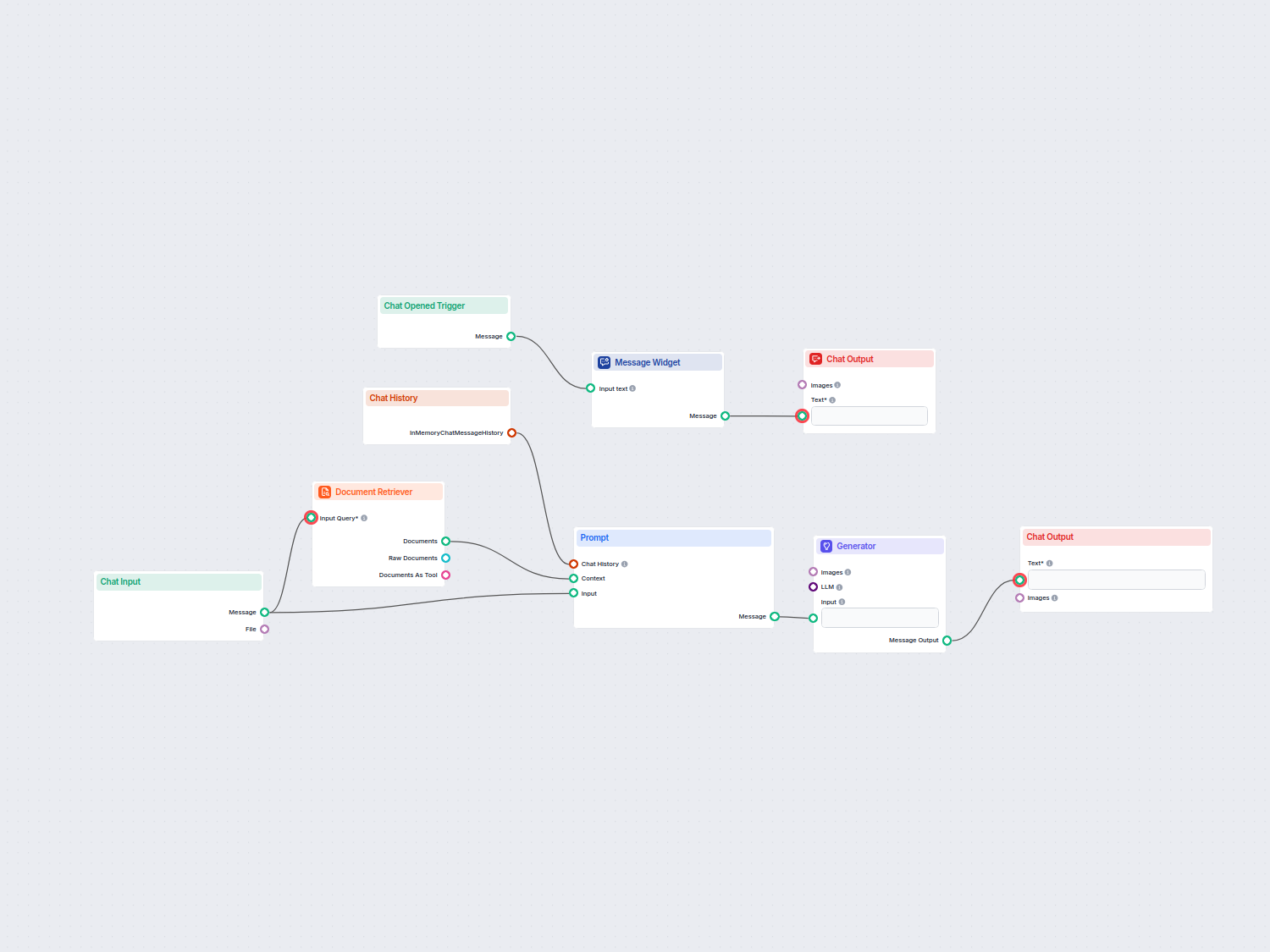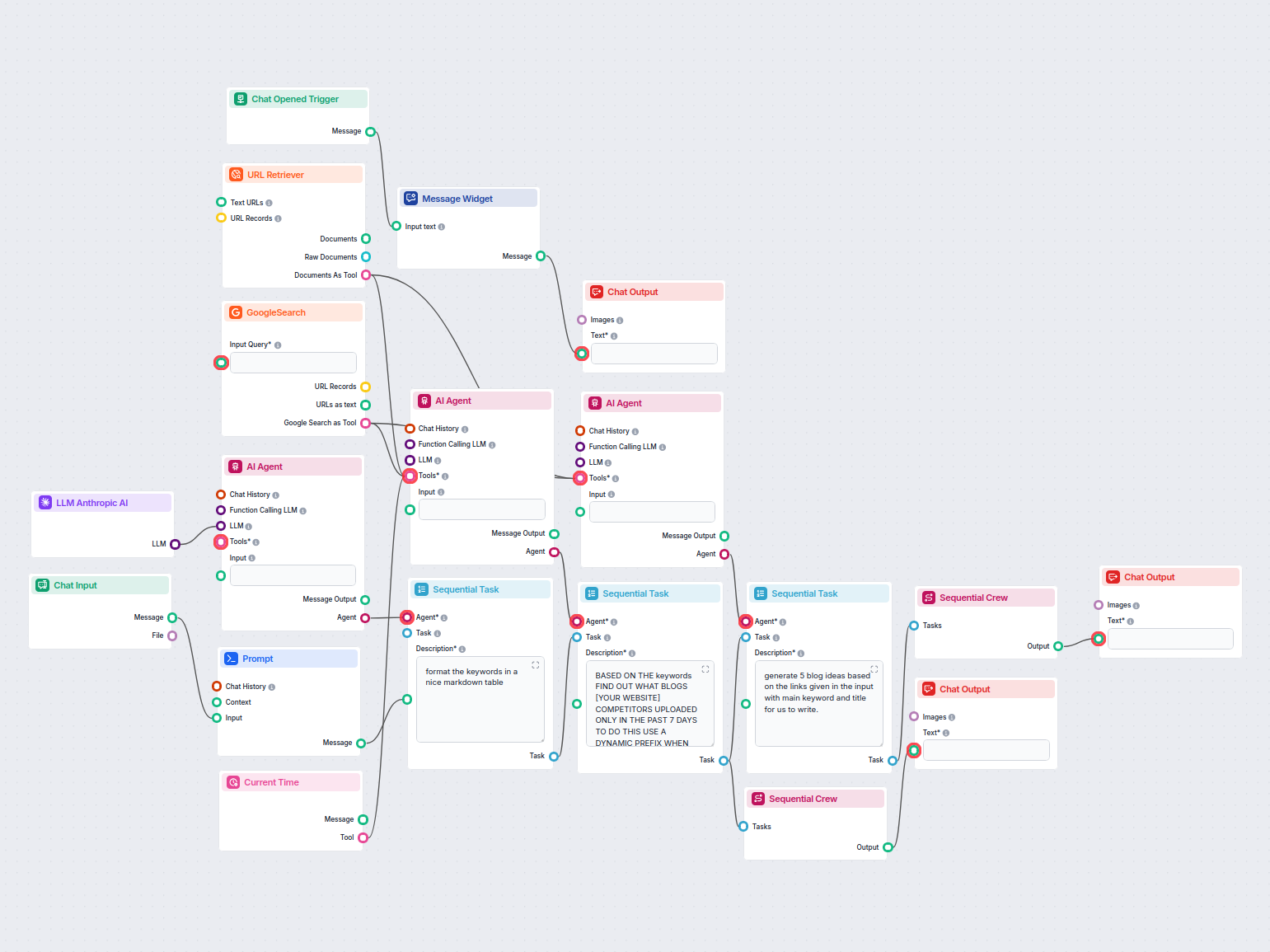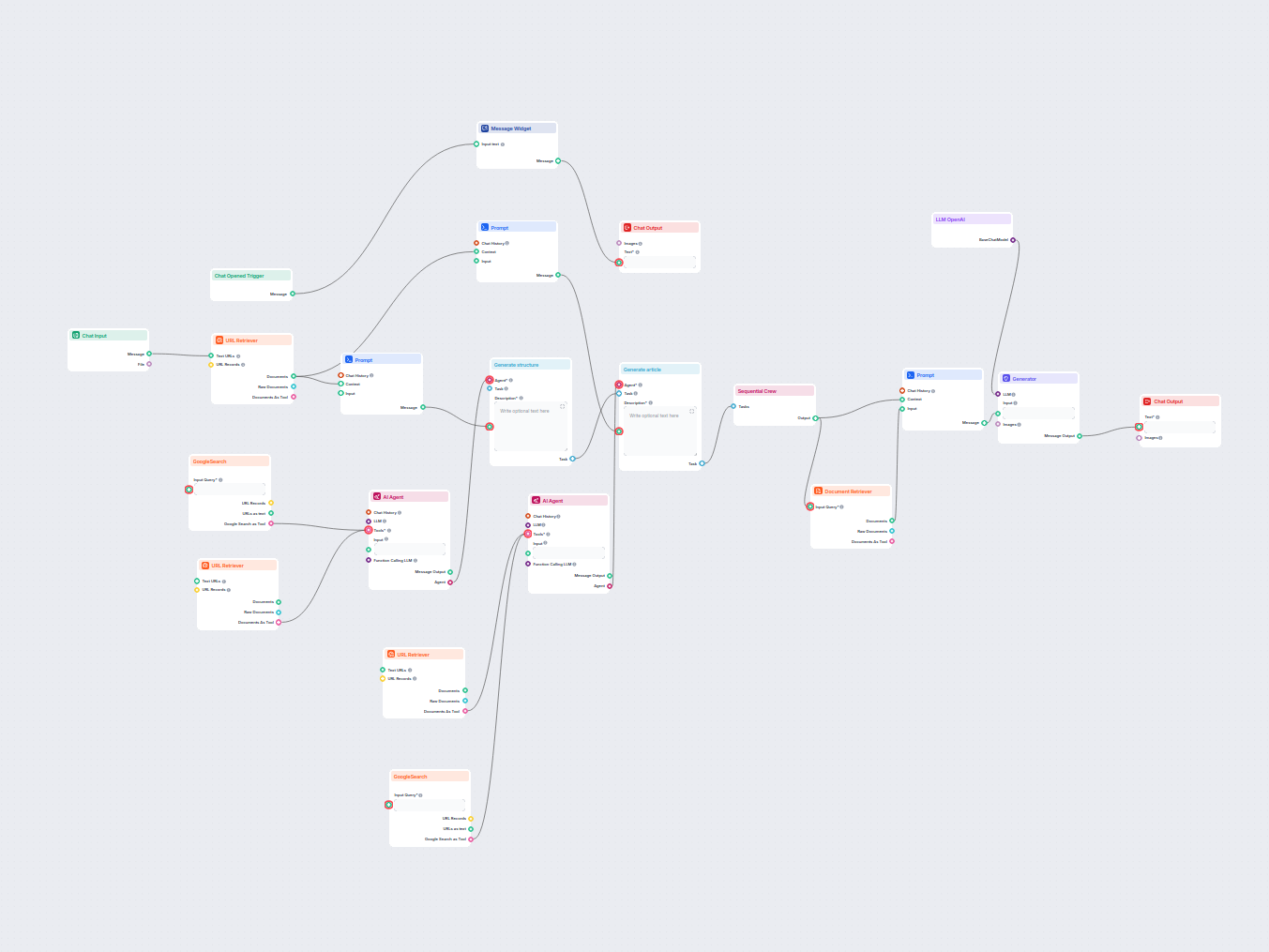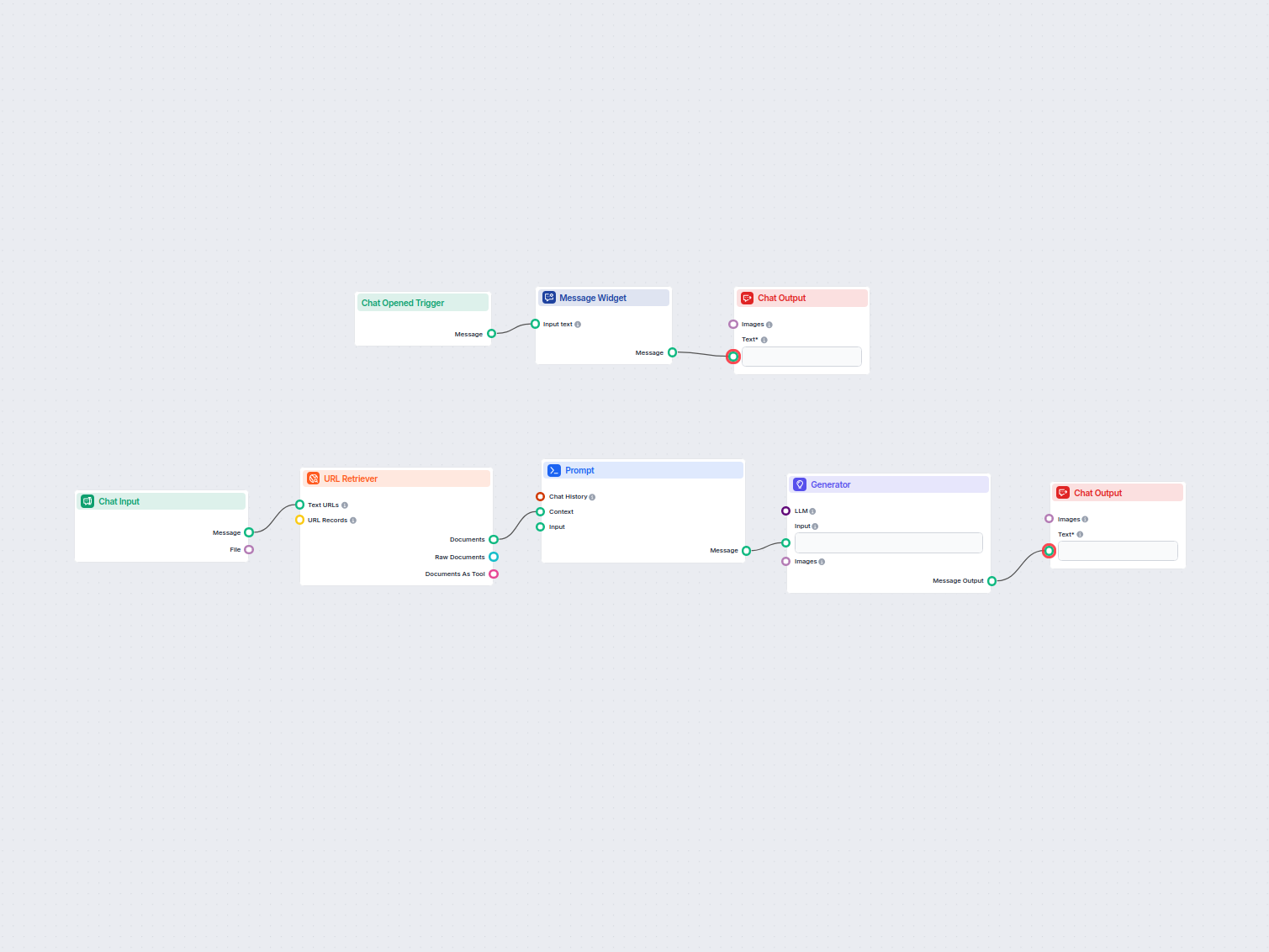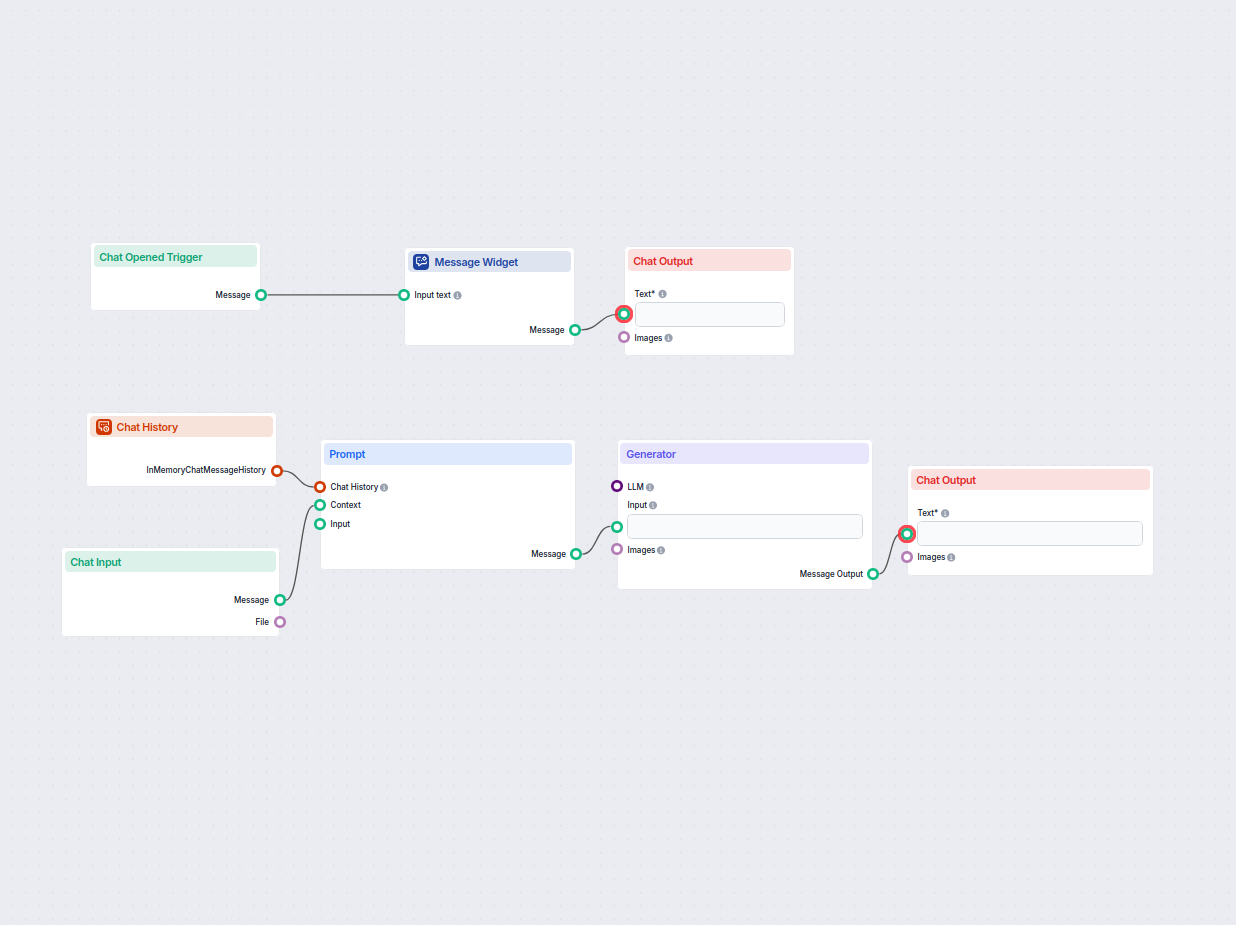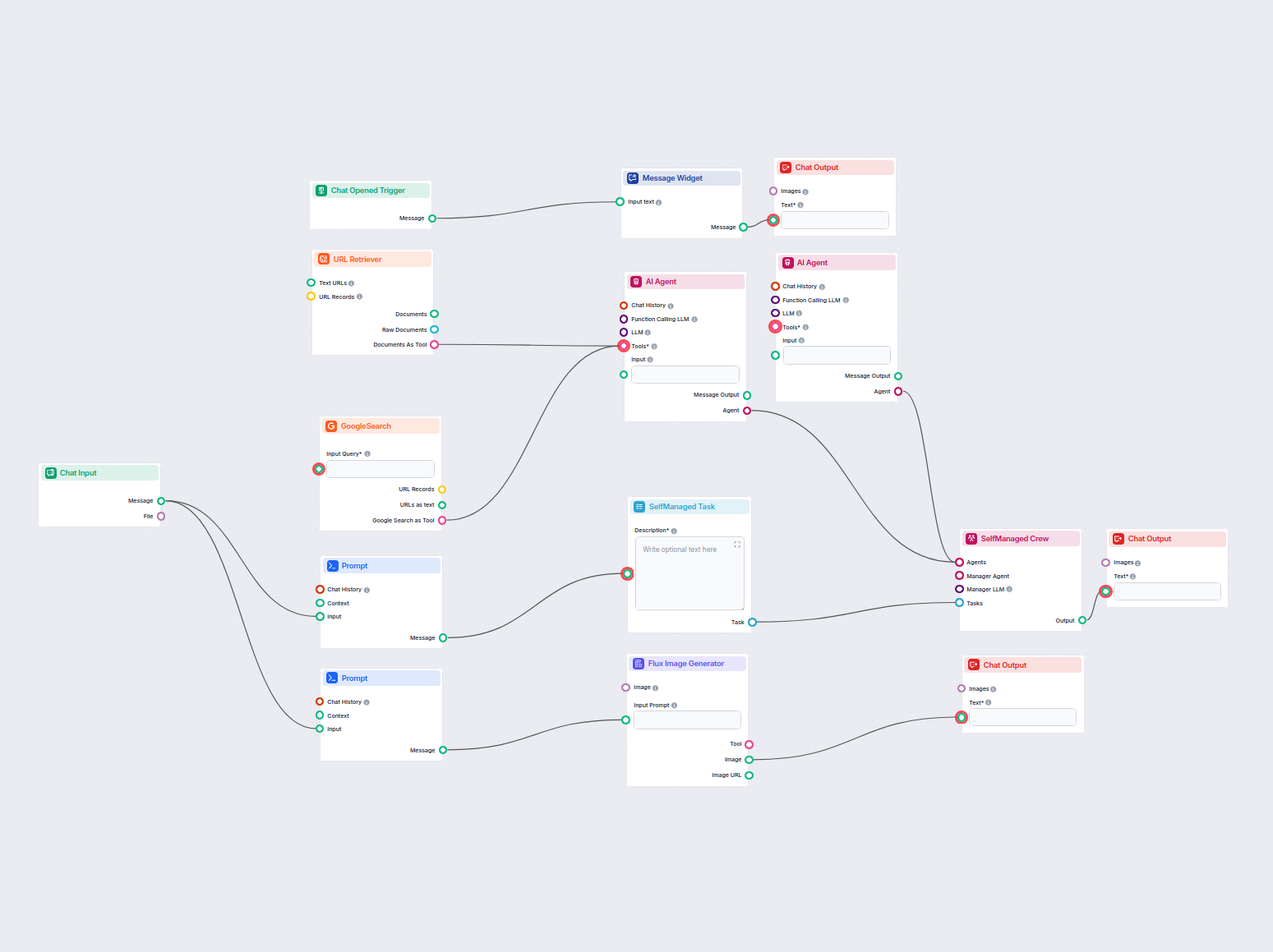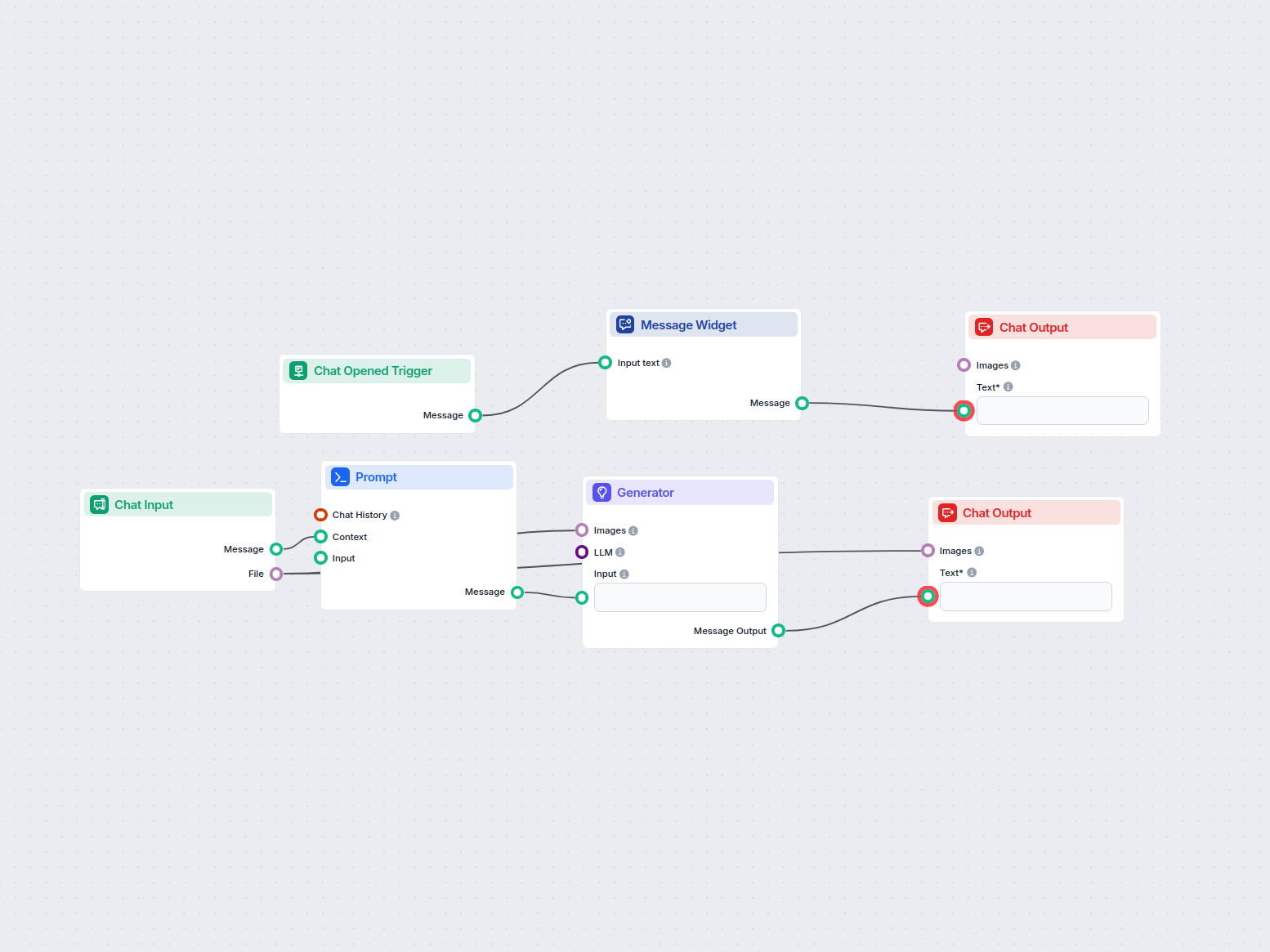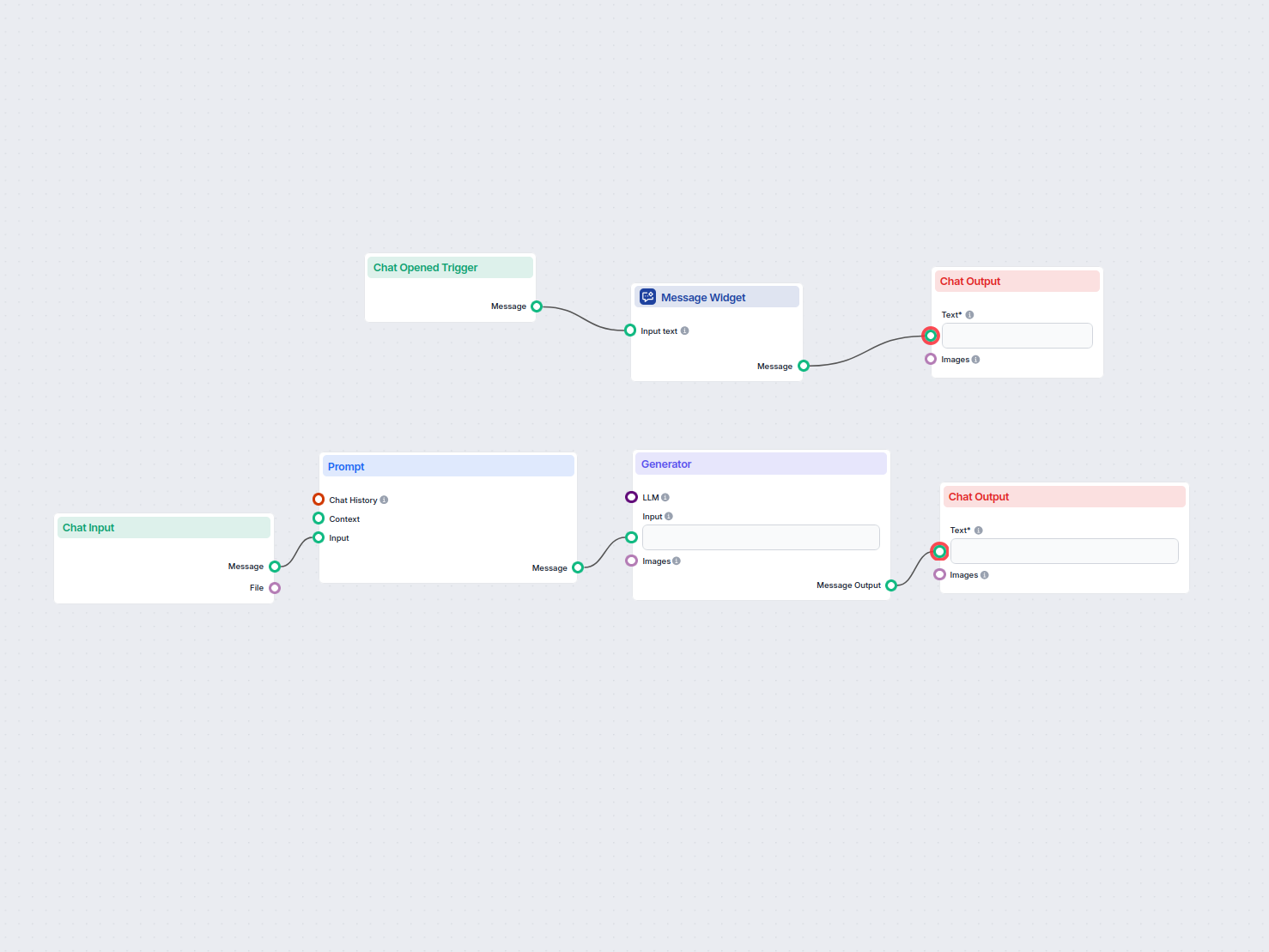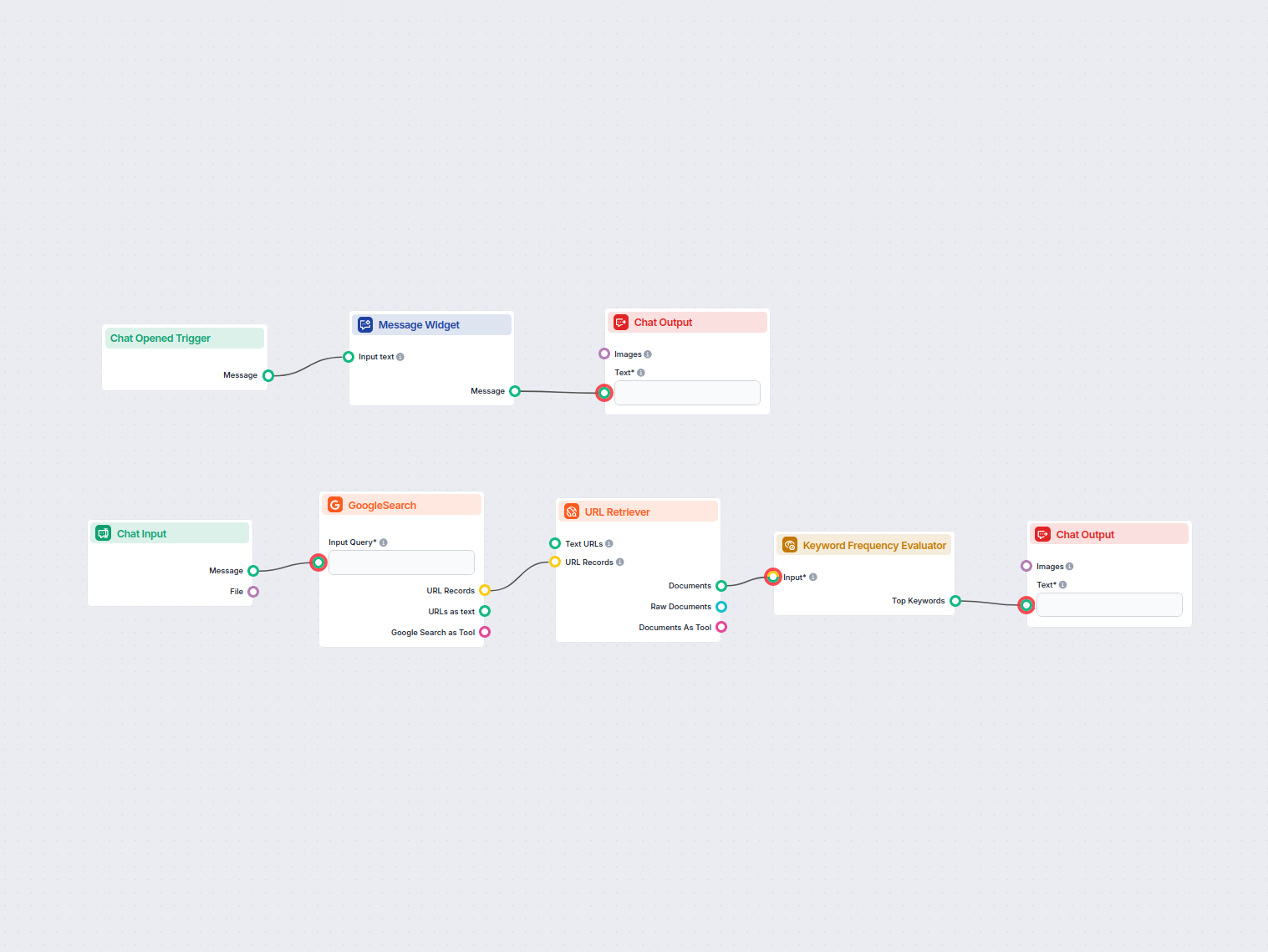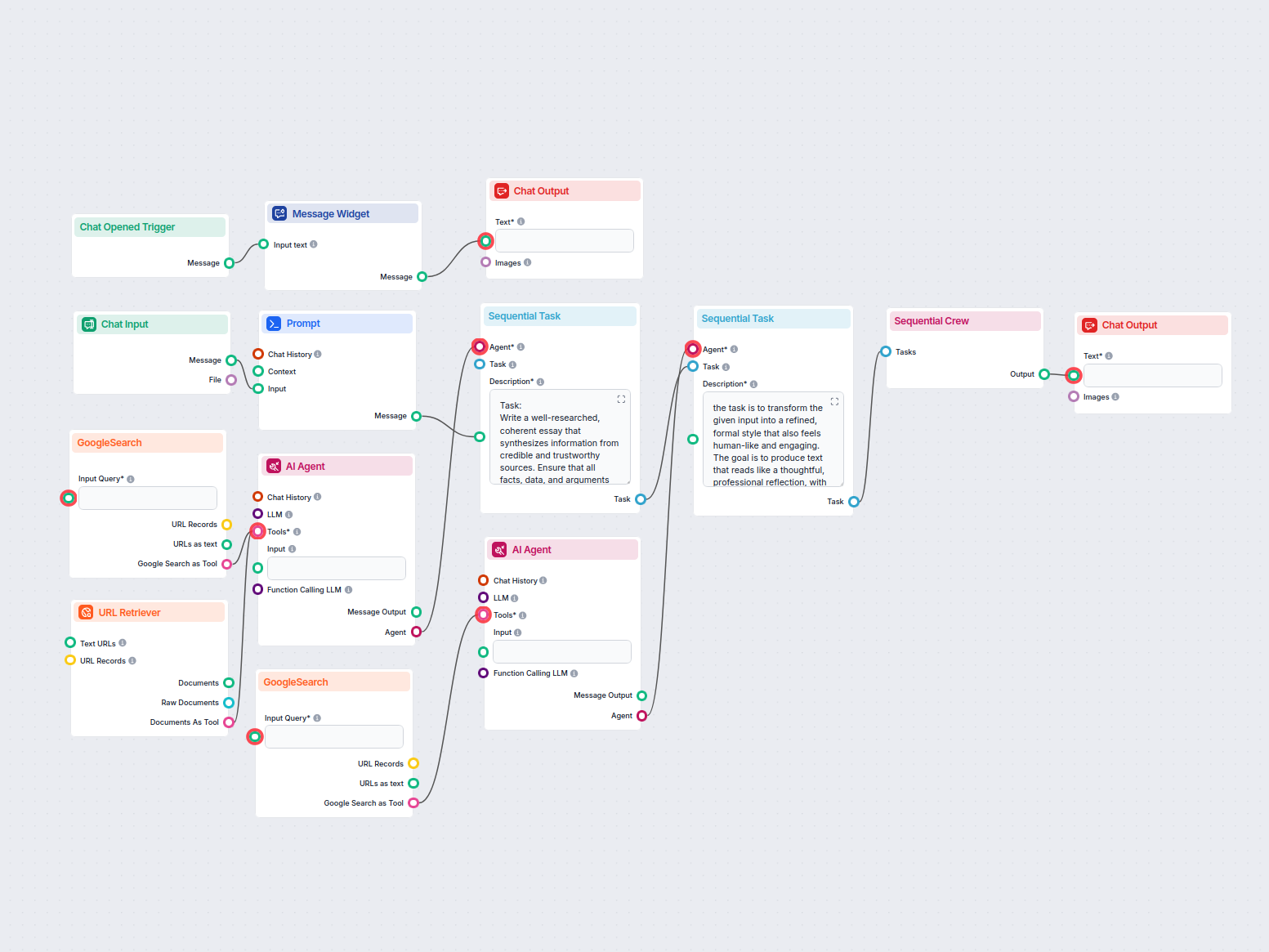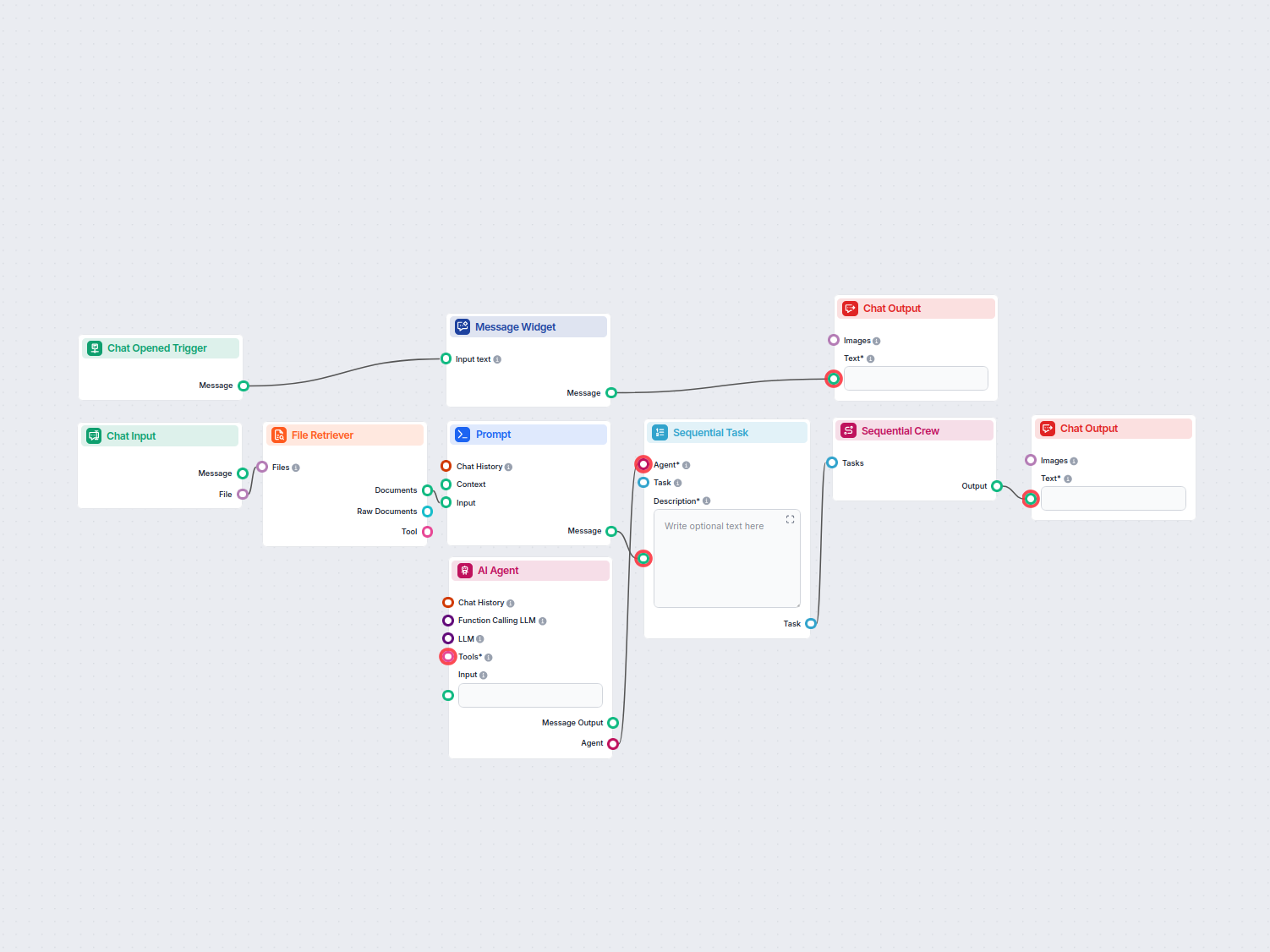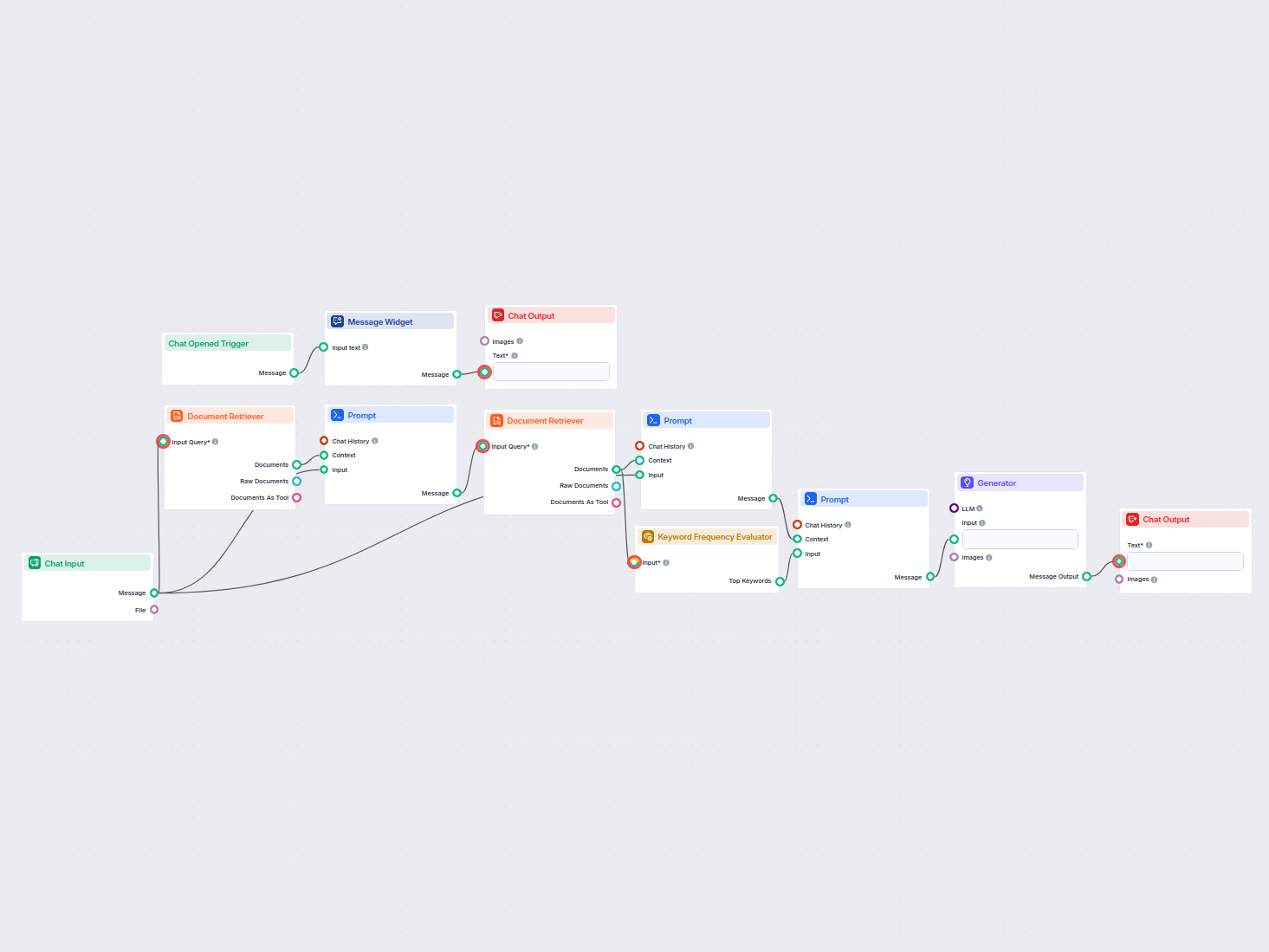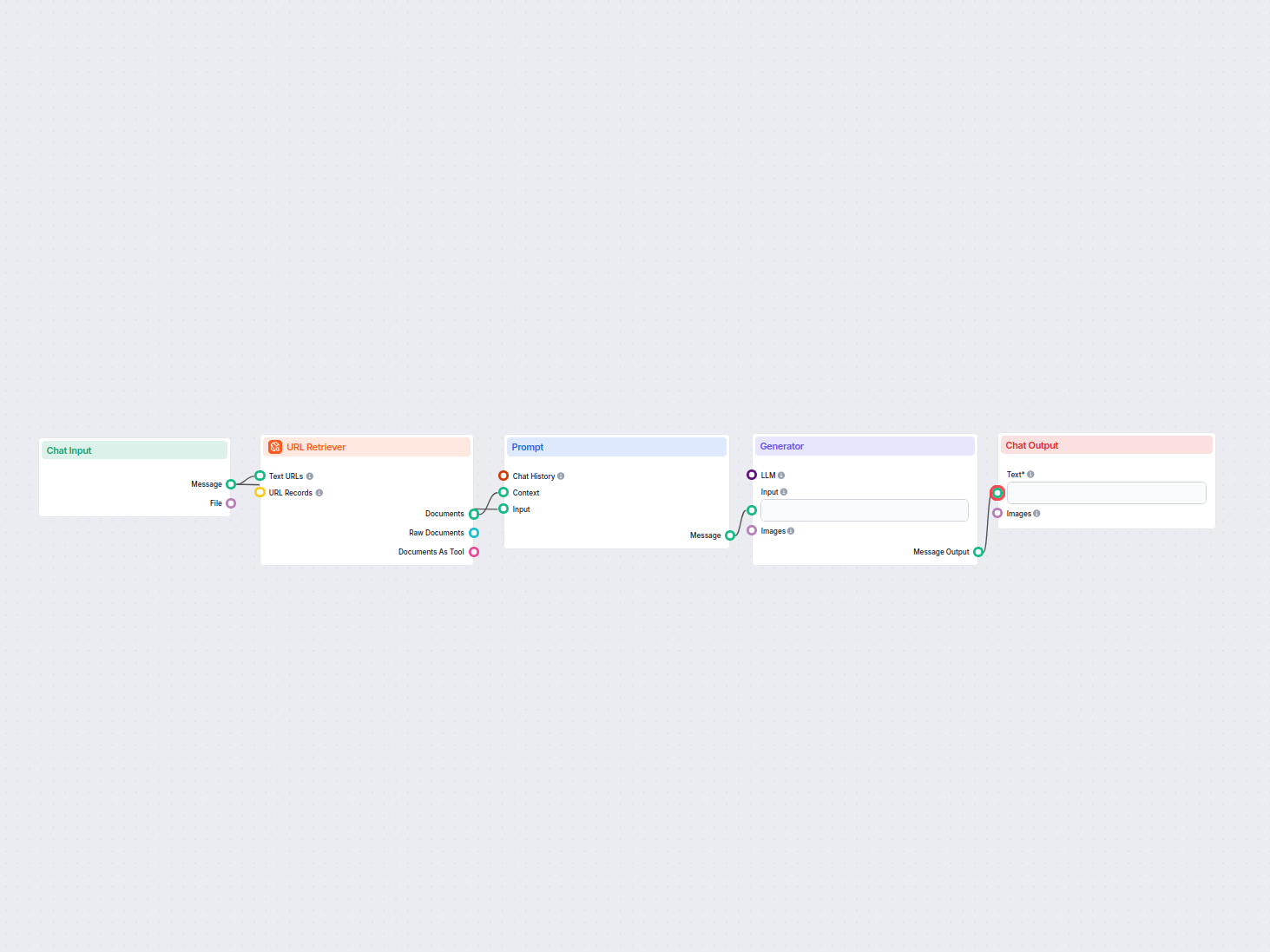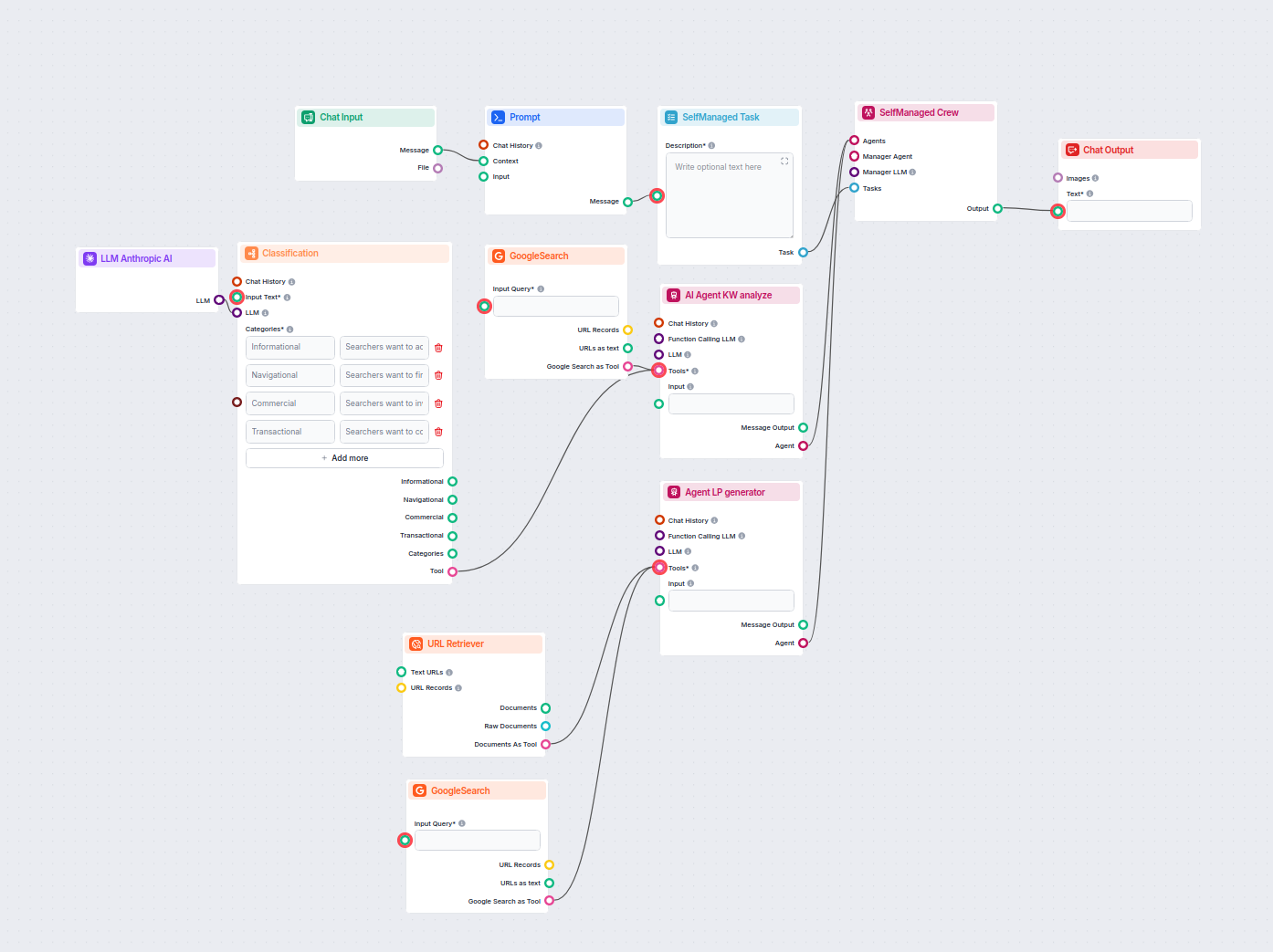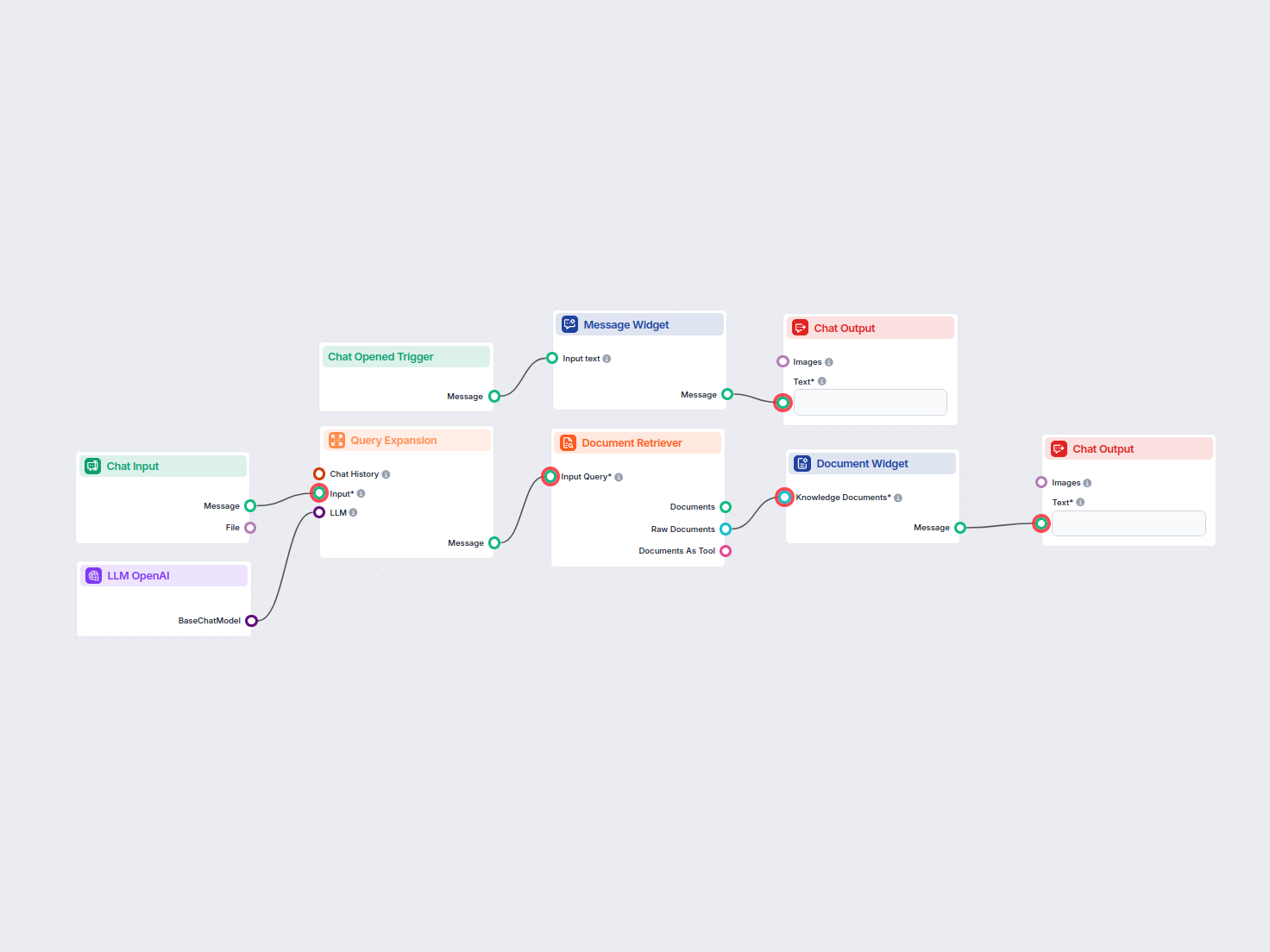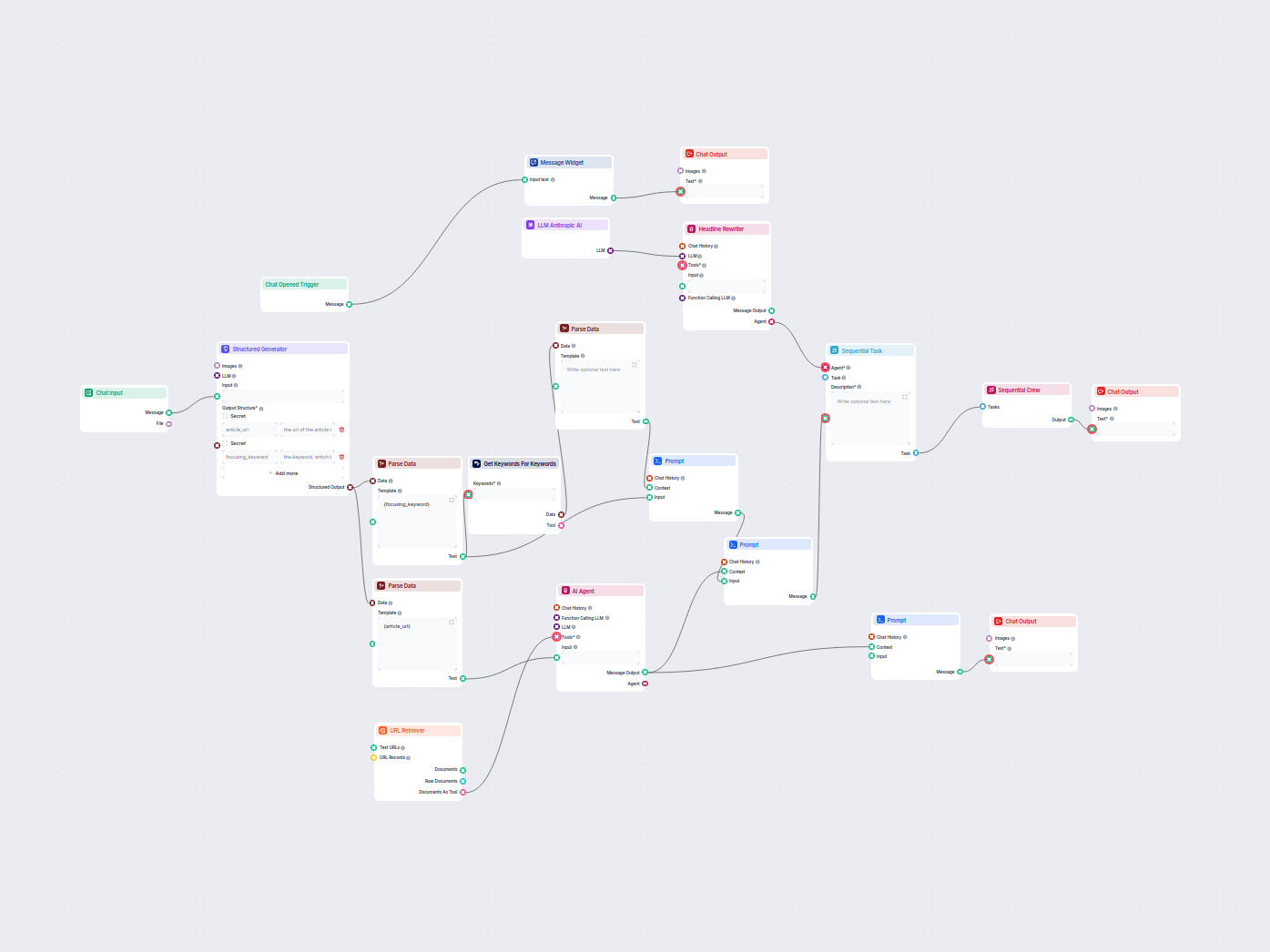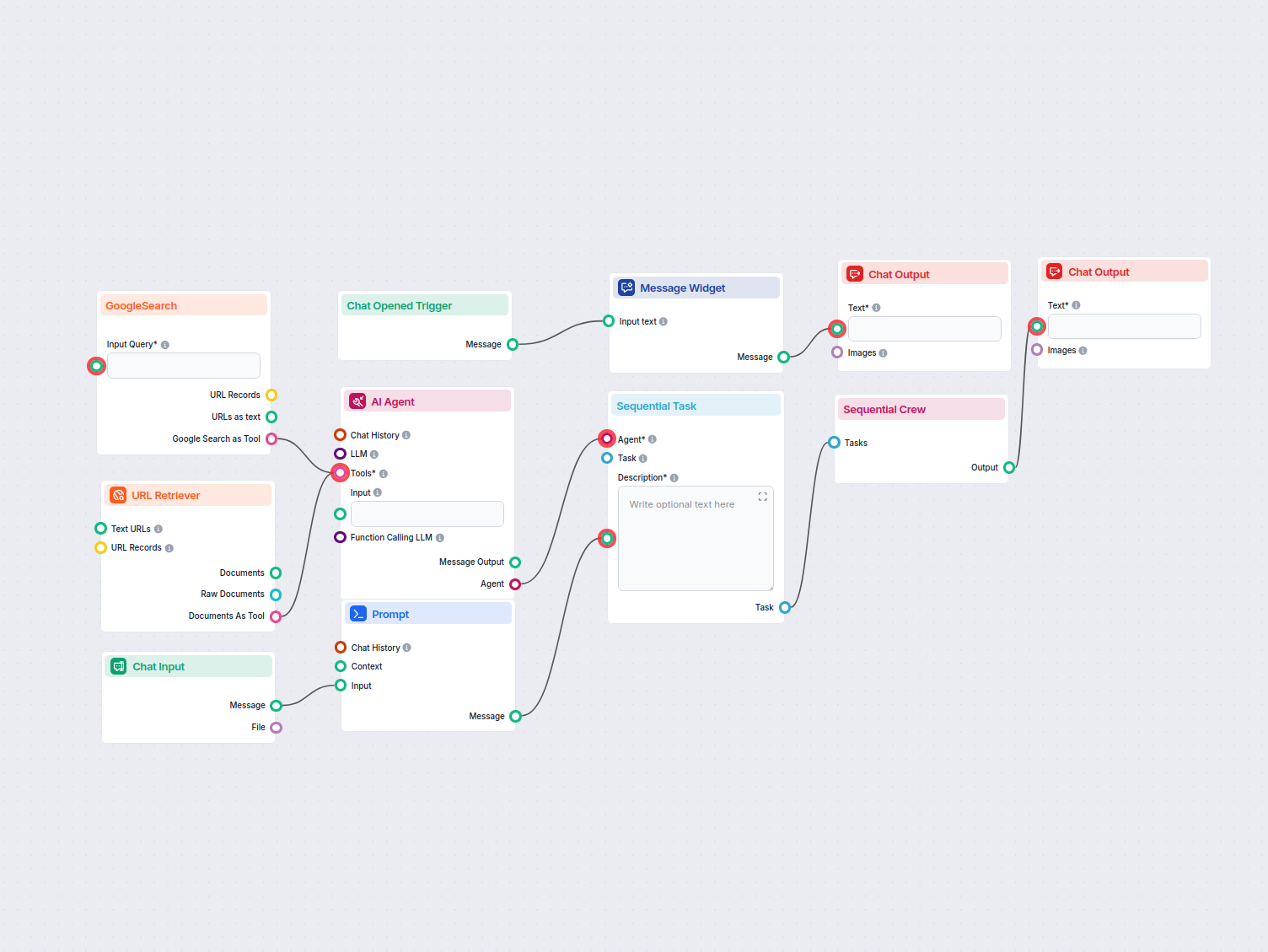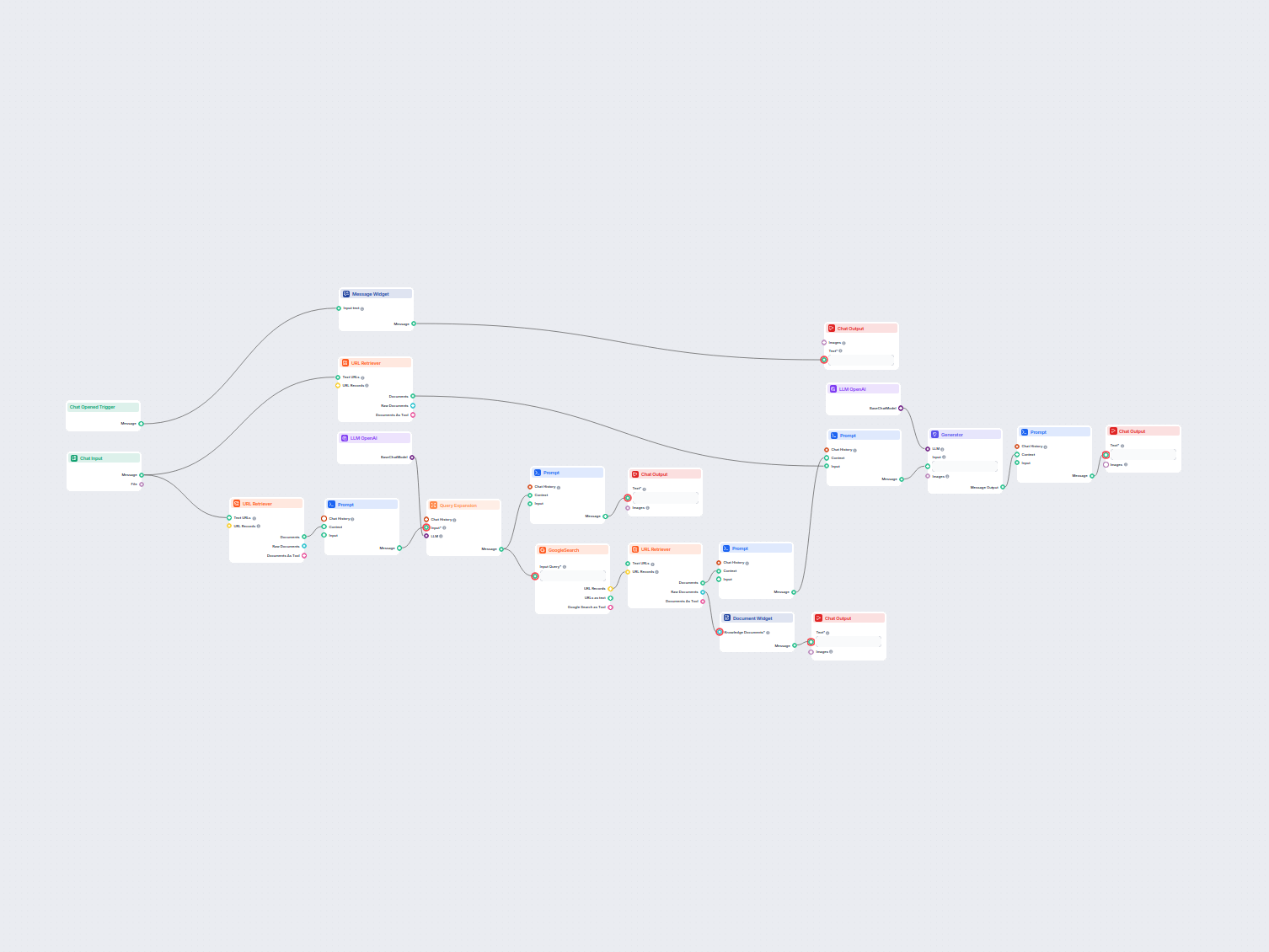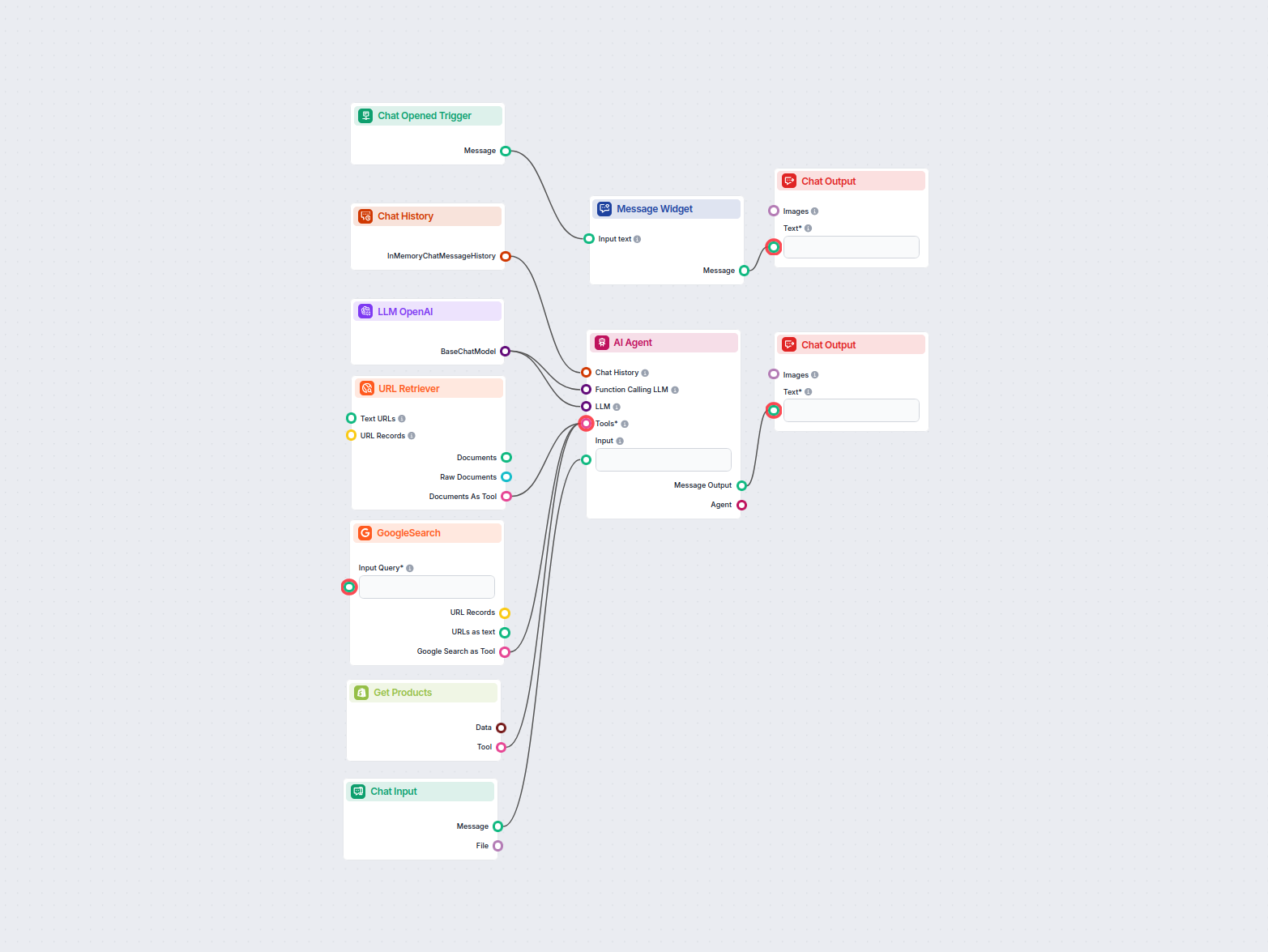
AI Assistant with Google Calendar Awareness
An intelligent AI assistant that integrates with Google Calendar to help users manage their schedules. Users can interact via chat to check their events, find a...

Display custom messages anywhere in your flow with the Message Widget—great for greetings, instructions, and more, with Markdown support.
Component description
The Message Widget is a simple yet powerful component designed to display custom messages within your AI workflow. It can serve as a welcome message, prompt, or provide any other information to users or downstream components. This widget is particularly useful for enhancing user interaction, guiding workflow execution, and making your processes more intuitive.
The Message Widget outputs a message in the workflow’s output stream. The message can be fully customized and supports Markdown formatting, which allows you to include formatted text, lists, links, and more. You can use it to:
| Input Name | Type | Required | Description | Supports Markdown |
|---|---|---|---|---|
| Input text | Message | No | The message to display. Can be provided dynamically from upstream components | Yes |
| Message | String | Yes | The main message to show. Markdown formatting is supported. | Yes |
| Show Once | Boolean | No | If enabled, the message will be shown only once, not on every run. | N/A |
| Output Name | Type | Description |
|---|---|---|
| Message | Message | The message that gets displayed |
Message object containing your custom text, which can be passed to subsequent components in your workflow.The Message Widget adds a human touch and helpful context to your AI processes. Here are some use cases:
| Feature | Details |
|---|---|
| Markdown Support | Yes |
| Customizable Message | Yes |
| Show Once Option | Yes |
| Inputs | Input text, Message, Show Once |
| Outputs | Message |
| Typical Use Cases | Welcome messages, notifications, prompts |
This component is easy to configure and can play a crucial role in making your AI workflows user-friendly and informative.
To help you get started quickly, we have prepared several example flow templates that demonstrate how to use the Message Widget component effectively. These templates showcase different use cases and best practices, making it easier for you to understand and implement the component in your own projects.
An intelligent AI assistant that integrates with Google Calendar to help users manage their schedules. Users can interact via chat to check their events, find a...
This AI-powered workflow finds the best SEO keywords for your blog article and automatically rewrites headlines to target those keywords, improving your content...
Easily generate creative and relevant business name ideas using AI. Users provide a short description about their business and instantly receive five tailored n...
Easily generate comprehensive business plans using AI. This workflow collects user input, utilizes chat history for context, and leverages a prompt template and...
This AI-powered workflow automatically solves CAPTCHA images uploaded by users. It guides users with instructions, processes the uploaded image using a prompt a...
A simple AI chat assistant workflow that leverages previous conversation history to generate relevant responses to user input. Includes a welcome message and us...
Deploy a smart AI chatbot that integrates seamlessly with FreshChat. The chatbot answers user inquiries using your internal knowledge base and intelligently for...
Deploy an AI-powered chatbot on your website that leverages your internal knowledge base to answer customer queries, and seamlessly forwards complex or unresolv...
Deploy a smart customer support chatbot for LiveAgent that automatically answers visitor questions, retrieves knowledge base documents, and escalates to a human...
An AI-powered live chat support chatbot that answers customer questions using an internal knowledge base and intelligently hands off complex queries to human ag...
This AI-powered workflow delivers a comprehensive, data-driven company analysis. It gathers information on company background, market landscape, team, products,...
An AI-powered customer service chatbot that uses your internal knowledge sources to provide instant, accurate, and helpful responses to customer queries. It lev...
An AI-powered customer service chatbot that automatically assists users, retrieves information from internal documents and the web, and seamlessly escalates to ...
This AI-powered workflow streamlines the process of tailoring a user's CV to match a specific job posting. By analyzing both the original CV and the job descrip...
Generate in-depth, SEO-optimized glossary articles by leveraging AI and real-time web research. This flow analyzes the top-ranking content and writing styles, e...
Streamline your Gmail workflow with an AI-powered assistant that can search, organize, and manage emails, create and send new messages, and automate label manag...
This AI-powered workflow extracts specific information from a Google Doc and then expands on it by researching across sources like Google Search, Wikipedia, and...
This AI-powered workflow automates contact management in HubSpot CRM. Users can easily search, create, or update contacts through a chat interface powered by an...
Automate invoice processing by uploading invoice images and extracting key invoice data, such as invoice number, type, language, items, prices, and total amount...
This AI-powered lead generation chatbot provides personalized customer support using your internal knowledge base, identifies potential leads in real-time, and ...
Automatically create engaging and professional LinkedIn headlines using AI. Just provide a brief description of your experience, and this flow generates a catch...
Automatically generates actionable meeting minutes and follow-up emails from your meeting attachments using AI, and exports the results as a PDF. Ideal for stre...
This AI-powered workflow automates meeting scheduling through Google Calendar. Users interact with a chatbot that finds available times, creates, views, or dele...
Generate comprehensive, AI-driven reports on software product use cases for marketing and sales. This workflow researches the product across web sources and You...
Evaluate the readability of any text using multiple established metrics, including Flesch Kincaid, Coleman Liau, Dale-Chall, and more. Instantly receive detaile...
This AI-powered workflow helps sales professionals prepare for meetings by generating a comprehensive prep sheet. By providing a company name, the flow research...
Automate your customer support with an AI chatbot that answers questions using your internal knowledge base and seamlessly connects users to a human agent via L...
Automatically organizes your keyword list into topic clusters using AI, producing a structured and easy-to-analyze table for enhanced content strategy and SEO p...
This AI workflow analyzes any company in depth by researching public data and documents, covering market, team, products, investments, and more. It synthesizes ...
Automatically generates an engaging feature image for any blog post by analyzing its content. Just provide the blog URL, and the workflow uses AI to understand ...
This workflow determines if an email address is from a generic free email provider or from a custom business domain. It's useful for lead qualification and iden...
AI chatbot assistant powered by OpenAI GPT-4o that automatically searches and leverages internal company documents to answer user questions. Delivers context-aw...
Automatically analyze top-ranking competitor blogs from the past week and generate new blog ideas for your website. This AI workflow researches competitor conte...
Transform technical documentation from a URL into a compelling, SEO-optimized article for your website. This flow analyzes top-ranking competitor content, gener...
Generate SEO-friendly FAQ sections from any website URL and automatically format the FAQs in Schema.org markup to enhance search engine visibility.
Transform your images using advanced AI with the Flux model. Upload an image, provide a creative prompt, and generate stunning new visuals instantly. Ideal for ...
Transform your ideas into beautiful images in any aspect ratio using the Flux AI image generator. This flow guides users from idea submission to image creation,...
Automatically turn any YouTube video transcript into SEO-friendly web page content. Enter a YouTube URL and get a fully structured web page draft, complete with...
Automatically generate multiple Google Ads variations for any URL. Paste your website link and receive ready-to-use ad titles and descriptions, saving time and ...
An AI-powered assistant that answers user questions strictly based on the content of a provided Google Sheet. The workflow retrieves data from Google Sheets, in...
Generate Google Sheets formulas instantly from natural language requests. This AI-powered workflow helps users create accurate spreadsheet formulas by simply de...
A chatbot that lets users upload images and ask questions about their content. It uses OCR and visual recognition to analyze the image and provides relevant ans...
Generate engaging Instagram posts automatically, including catchy titles, creative captions, and visually appealing images using AI-powered content research and...
Effortlessly generate creative captions for images using AI. Upload an image and receive a catchy caption instantly, perfect for social media or creative projec...
Effortlessly generate fully formatted markdown tables from your input, perfect for documentation, presentations, and note-taking. This AI-powered flow streamlin...
This workflow allows users to instantly translate any input text into English using AI. Users enter or upload text, which is then processed and translated with ...
This AI-powered chatbot instantly provides detailed information about any IP address, including city, country, timezone, and ISP, by leveraging live data from a...
This flow analyzes the most frequently used keywords on top-ranking web pages for a target keyword. Ideal for SEO professionals and content marketers aiming to ...
Automatically generates factual, well-structured essays in MLA format using credible sources found via Google search. Ideal for students and professionals seeki...
Effortlessly turn the content of your PDFs or presentation slides into high-ranking, structured blog post ideas using AI. Upload your document and get tailored ...
Automatically generates a short, engaging paragraph for your website that includes links to the most relevant related articles. This AI-powered workflow analyze...
Automatically generates Schema.org structured data in JSON format for any website URL, making it easier for search engines to understand and index your website ...
This AI-powered workflow classifies search queries by intent, researches top-ranking URLs, and generates a highly optimized landing page for PPC and SEO campaig...
Easily search and retrieve information from private knowledgebase documents using semantic search powered by AI. The flow expands user queries, searches across ...
Automatically optimize your article's headlines and title for a specific keyword or keyword cluster to improve SEO performance. This workflow analyzes your arti...
Generate an SEO-friendly content brief outline by analyzing top-ranking Google search results for a given keyword. This workflow uses AI and web search tools to...
This AI-powered workflow analyzes the content structure of your web page, compares it with top-ranking competitor pages, and provides tailored recommendations o...
This AI-powered workflow helps Shopify merchants analyze competitor products, research market trends, and generate optimized pricing strategies. By combining Sh...
Showing 1 to 60 of 74 results
The Message Widget displays a customizable message within your workflow. It’s perfect for welcome messages, instructions, or other important notifications.
Yes, the Message Widget supports Markdown formatting, allowing you to style your message with bold, italics, lists, and more.
Absolutely. You can enable the 'Show Once' option so the message appears only a single time per session.
You can place the Message Widget anywhere in your workflow to provide helpful information or guidance to users at any step.
The message can be static or use input from other components, making it flexible for various use cases.
Add informative messages or greetings to your flows with the flexible Message Widget component in FlowHunt.
The Button Widget component in FlowHunt transforms text or input into interactive, clickable buttons within your workflow. Perfect for creating dynamic user int...
Showcase relevant documents directly within your chatbot responses using the Knowledge Source Widget. This component displays selected knowledge documents as vi...
The Chat Input component in FlowHunt initiates user interactions by capturing messages from the Playground. It serves as the starting point for flows, enabling ...
Cookie Consent
We use cookies to enhance your browsing experience and analyze our traffic. See our privacy policy.
